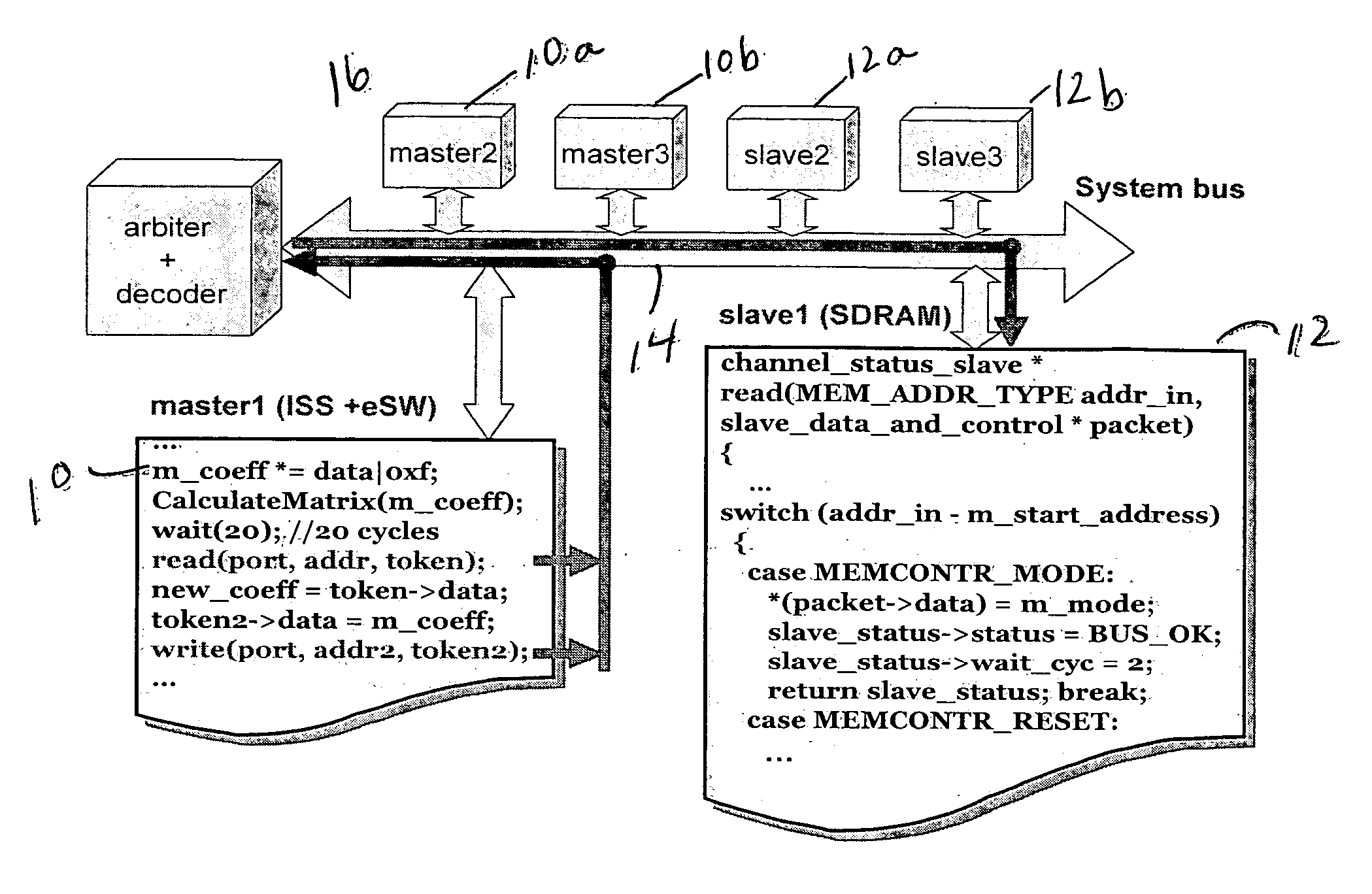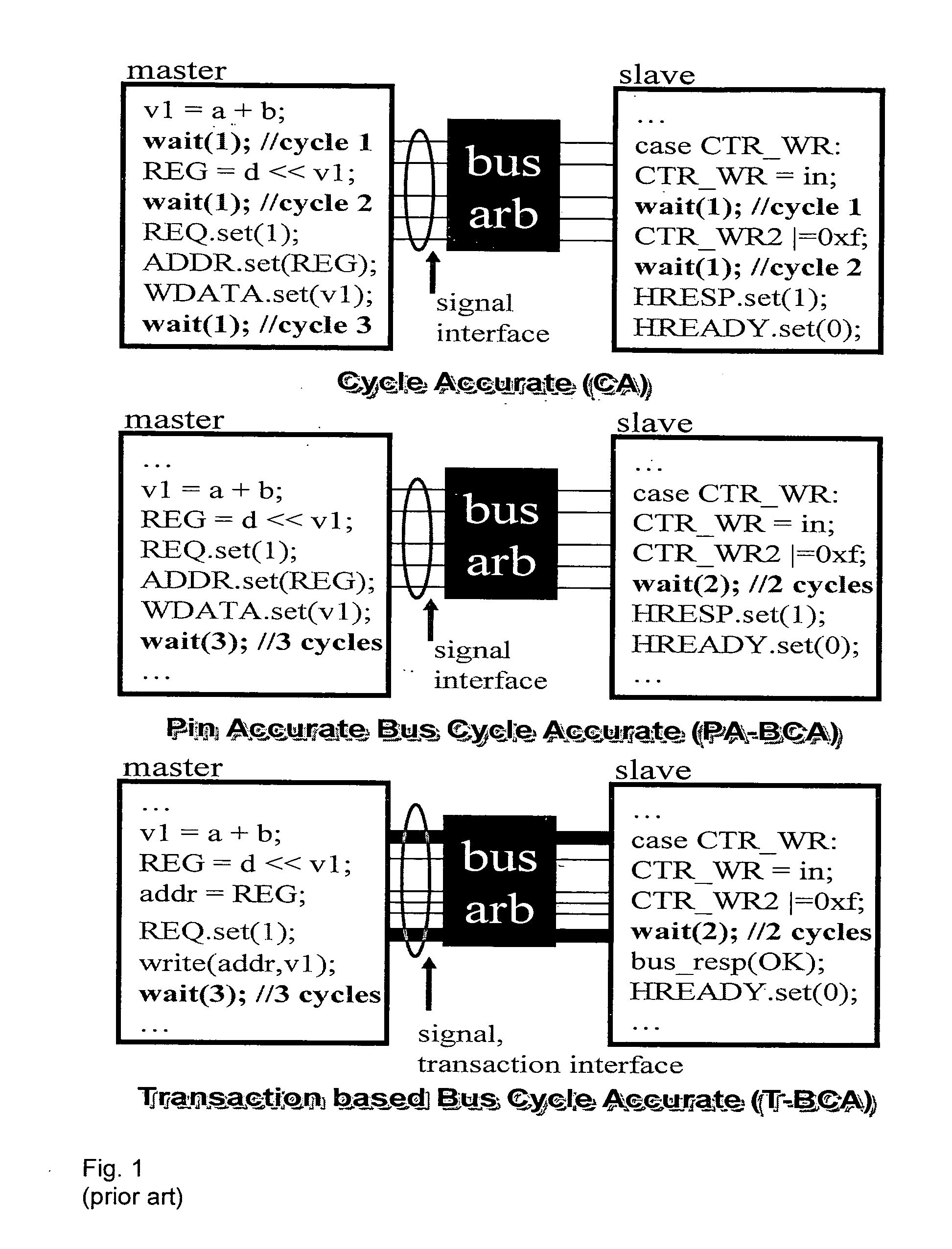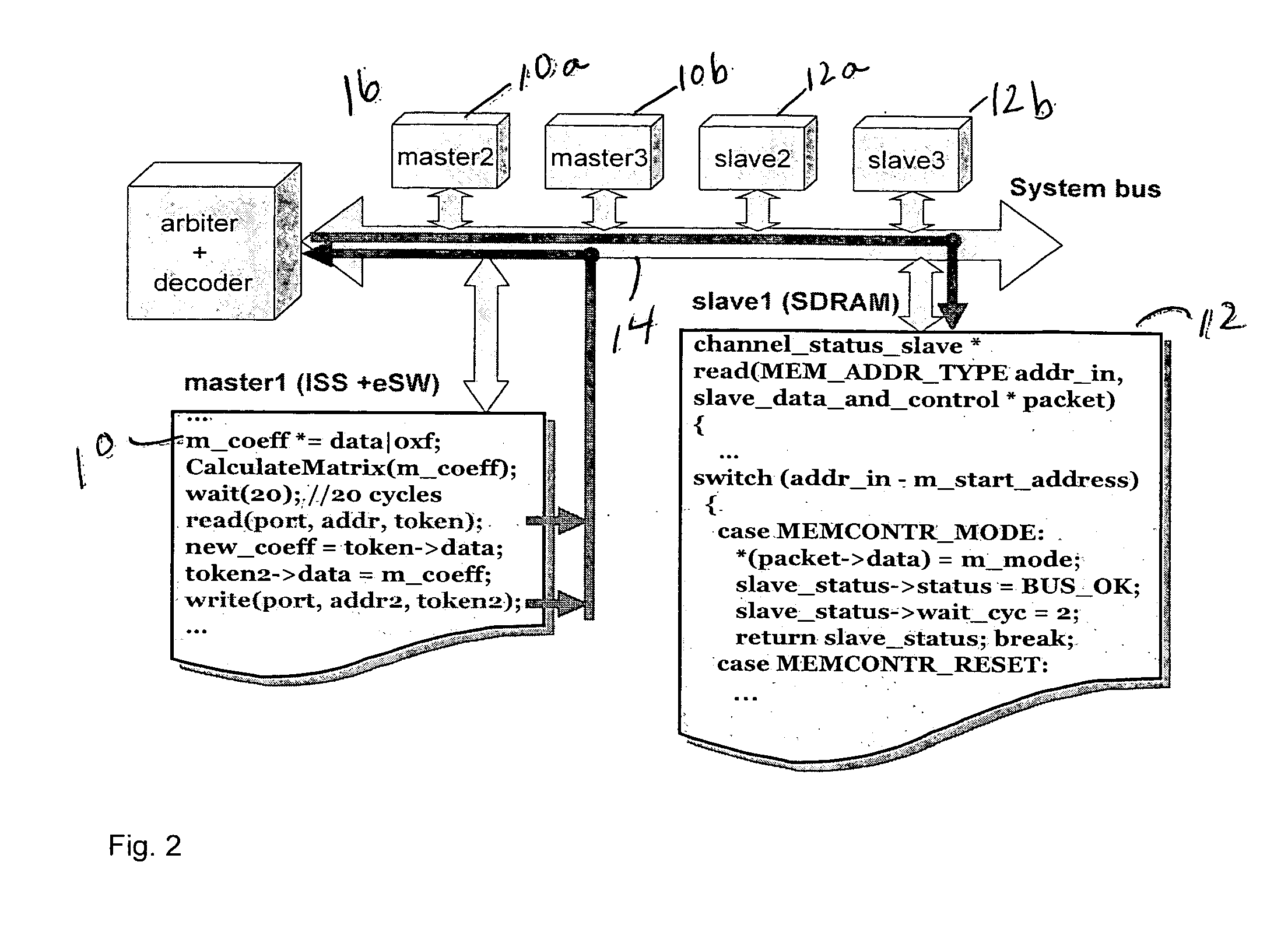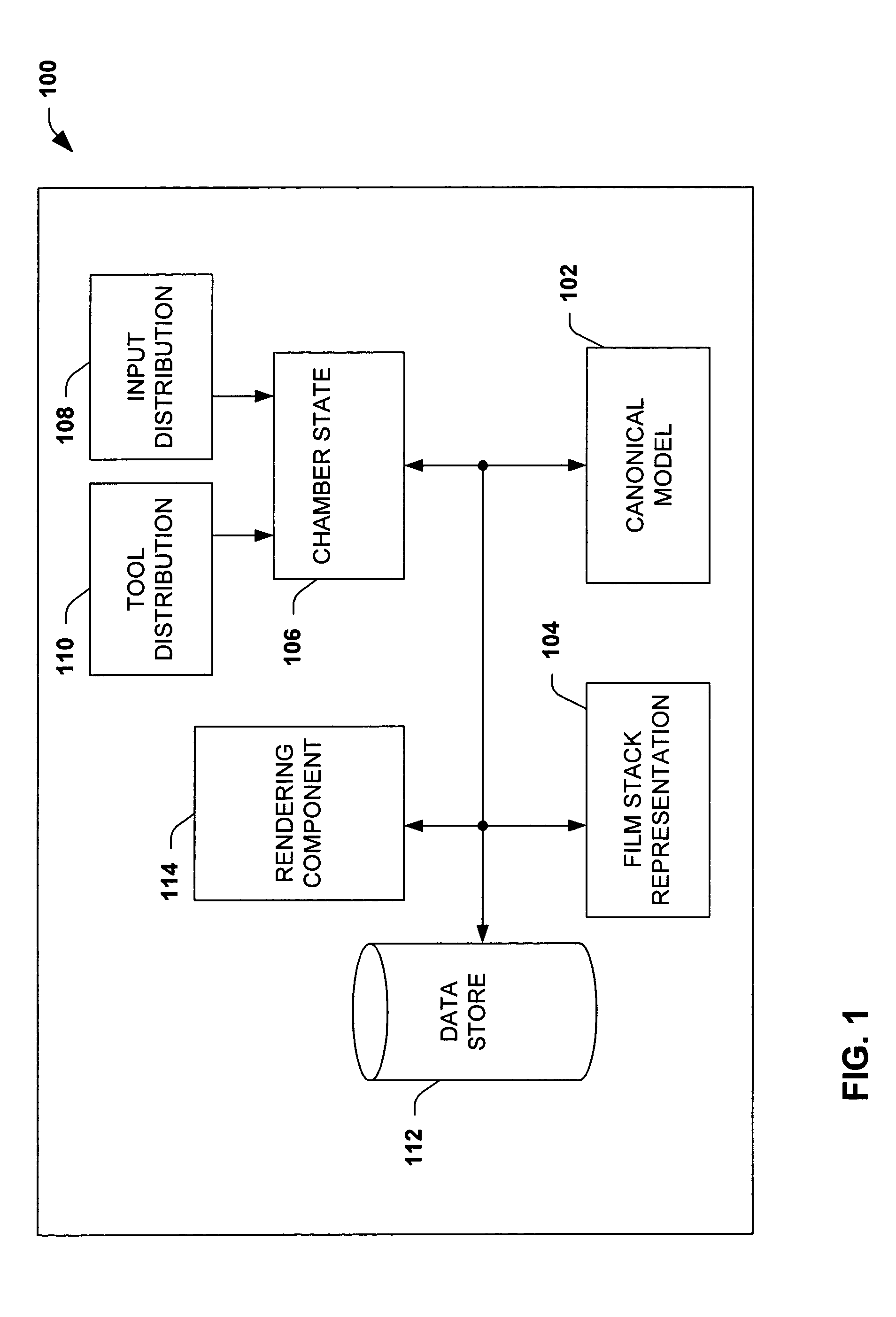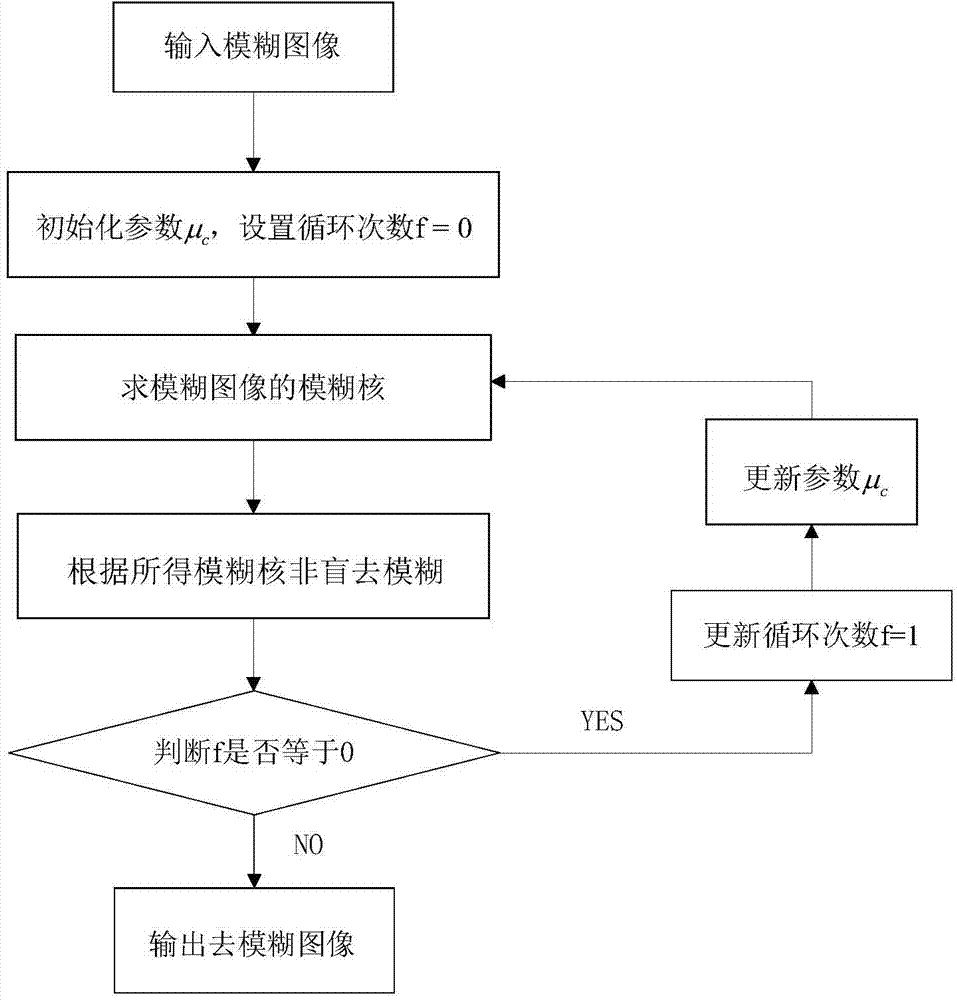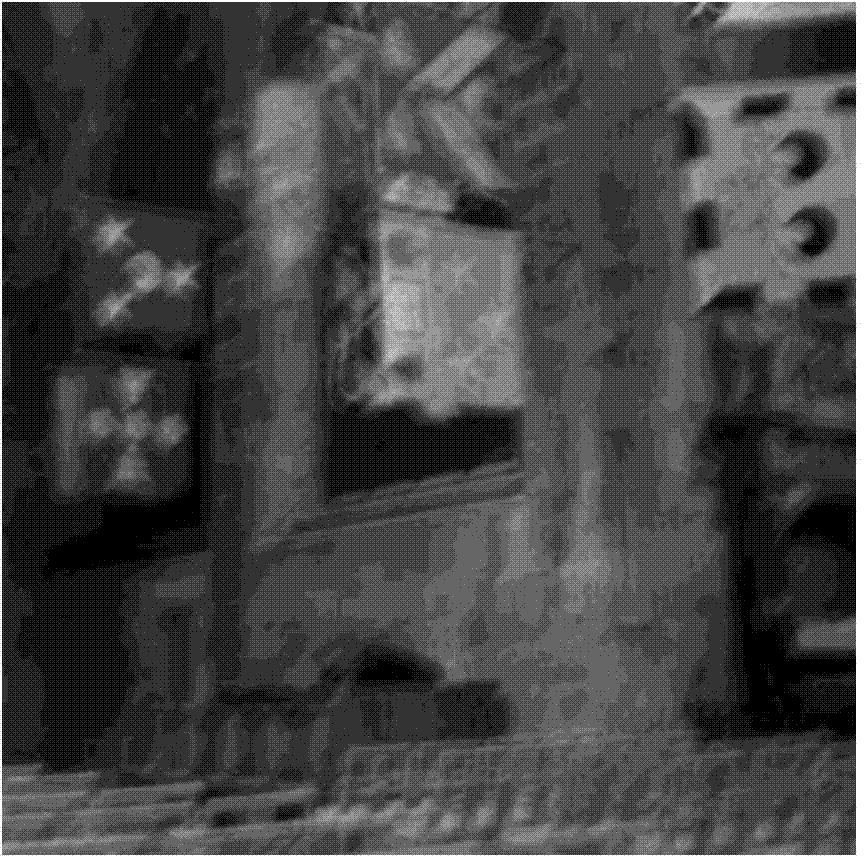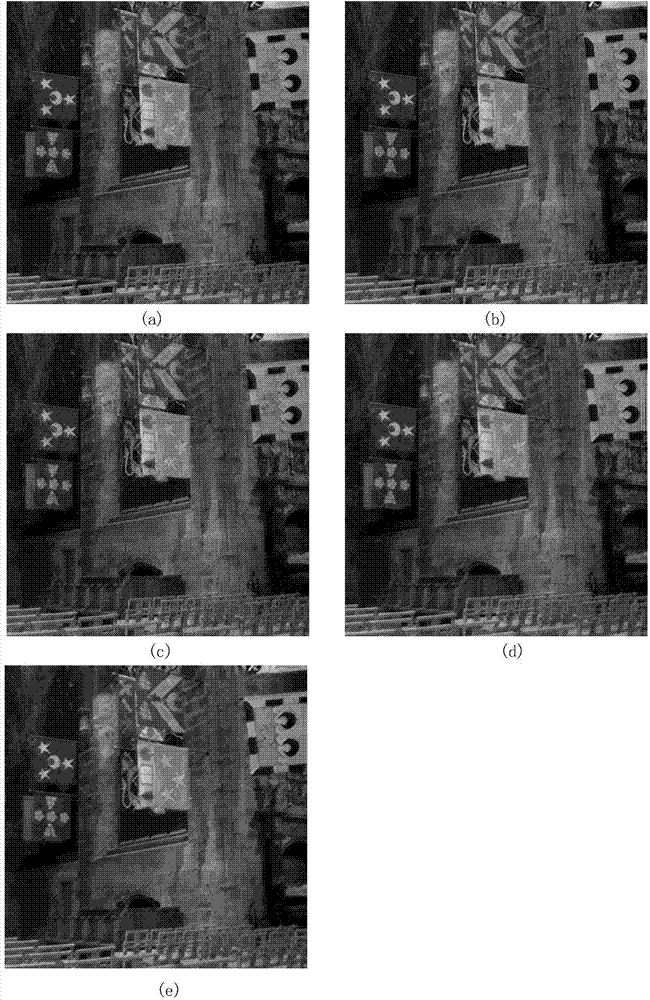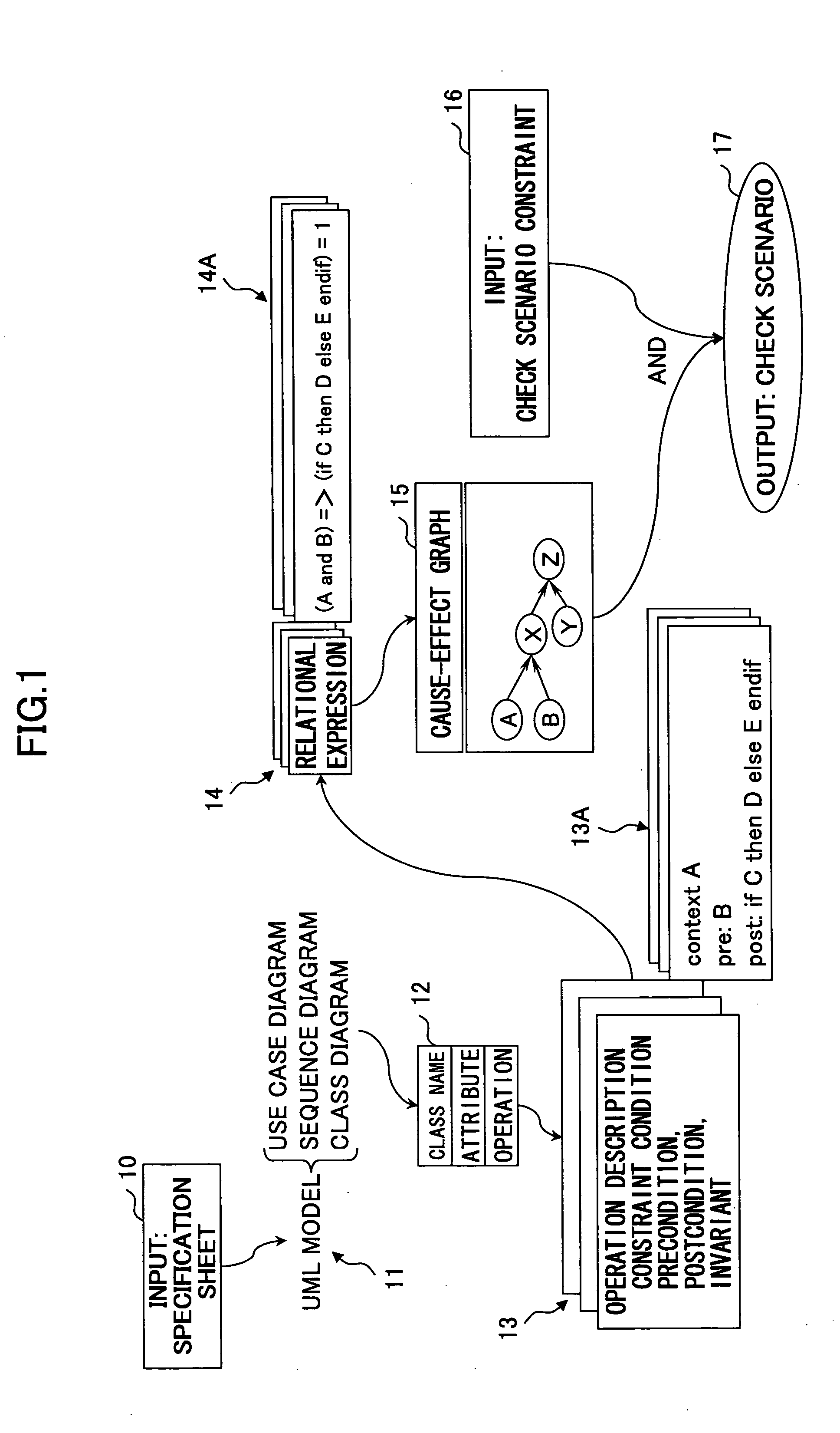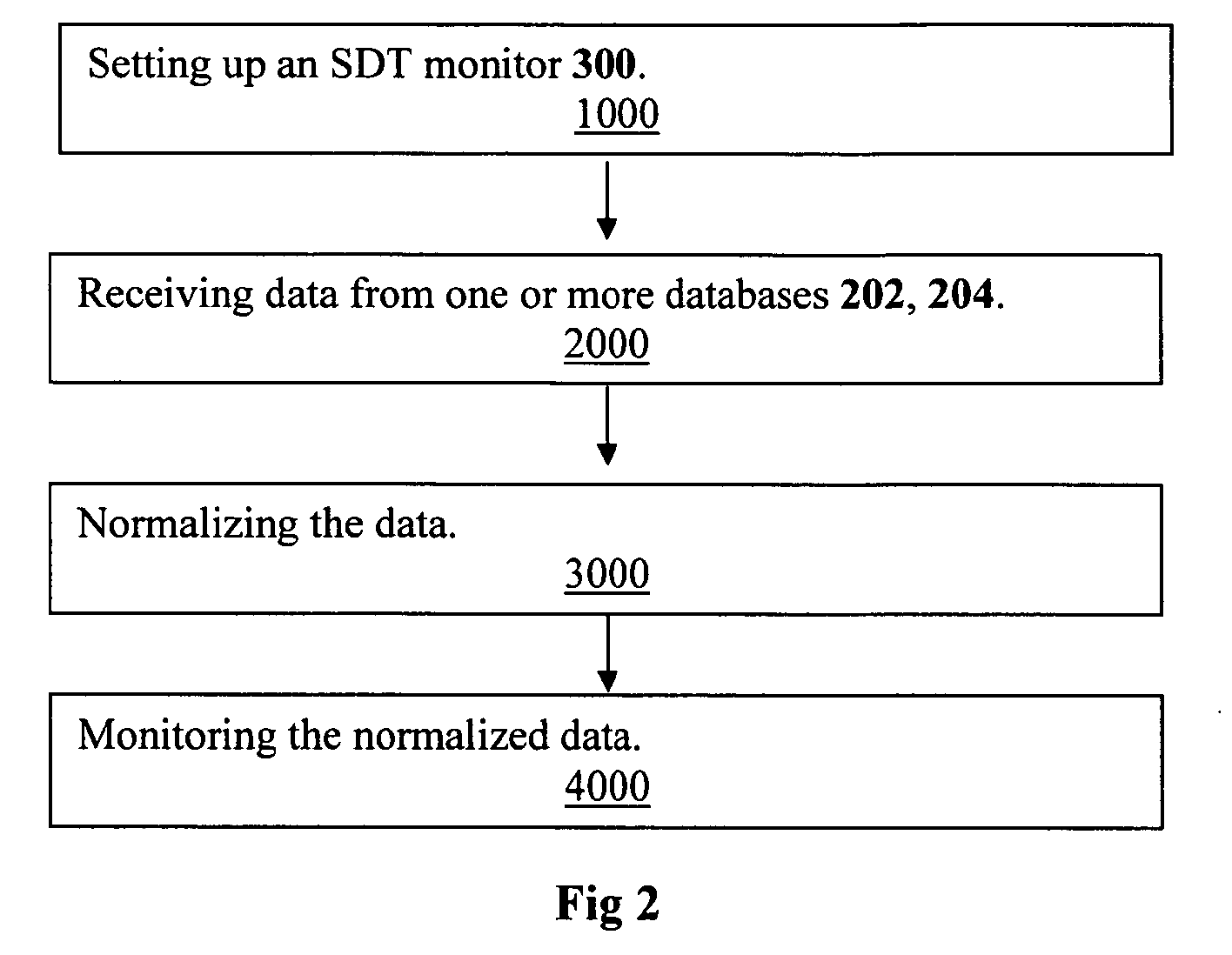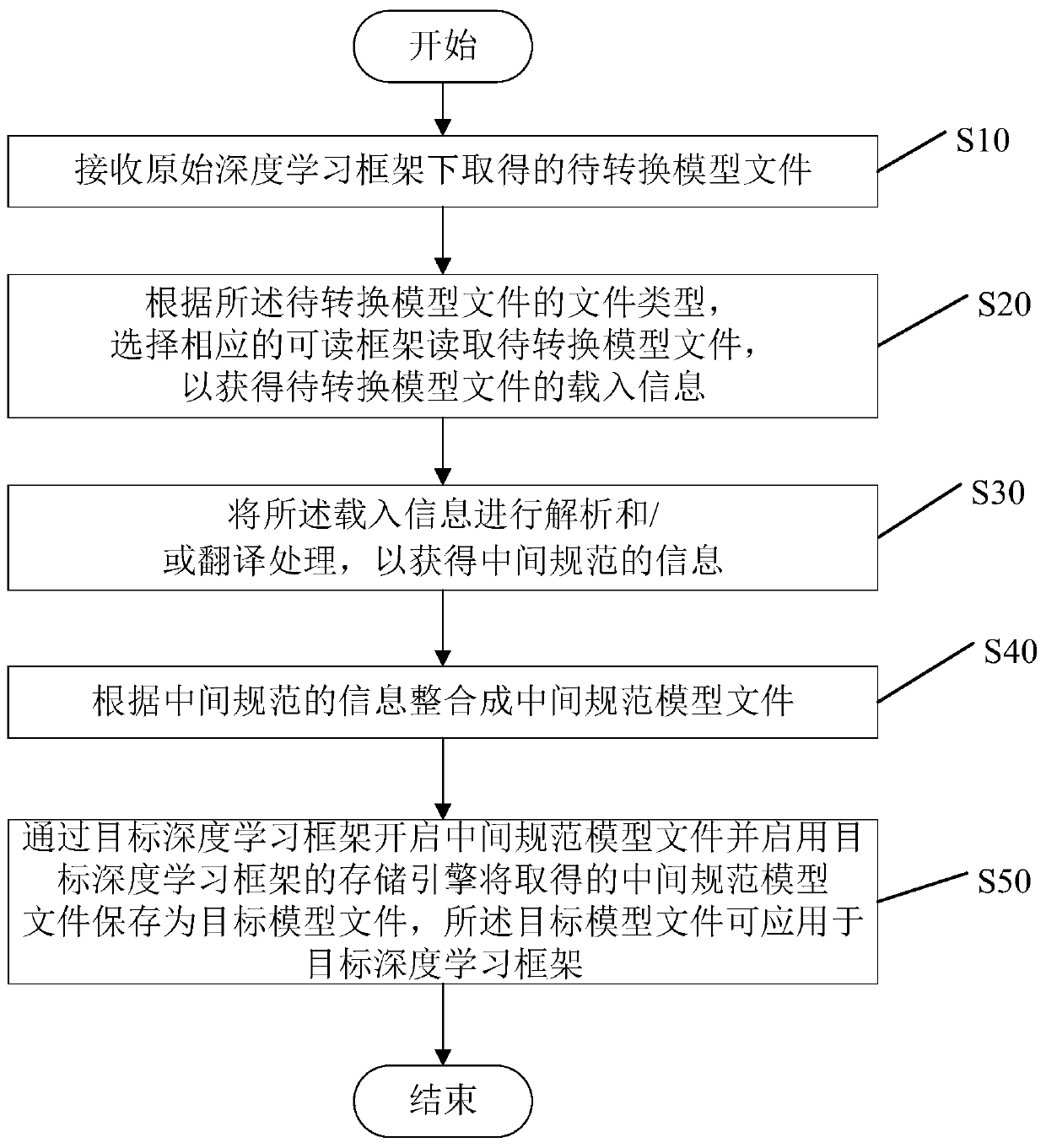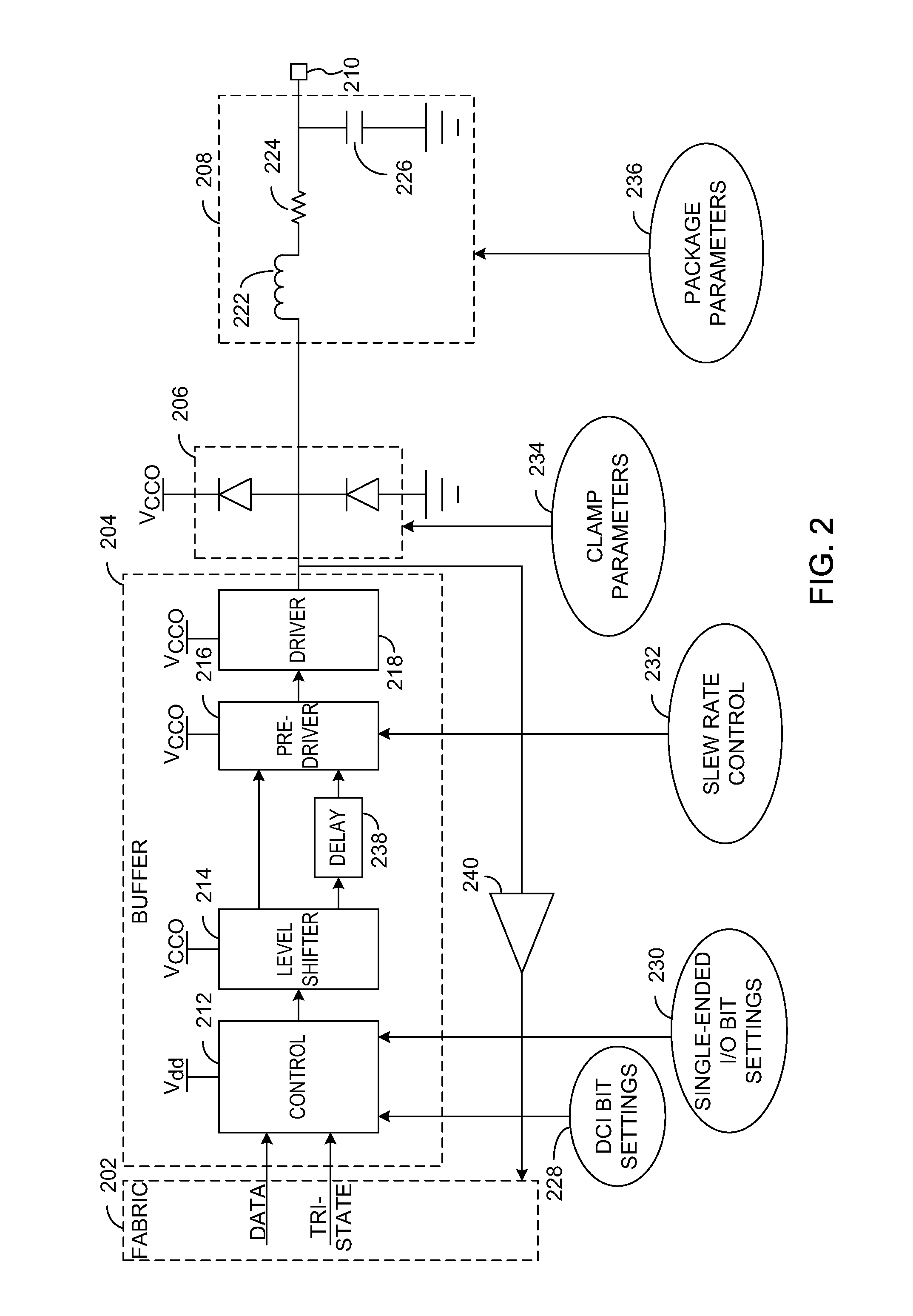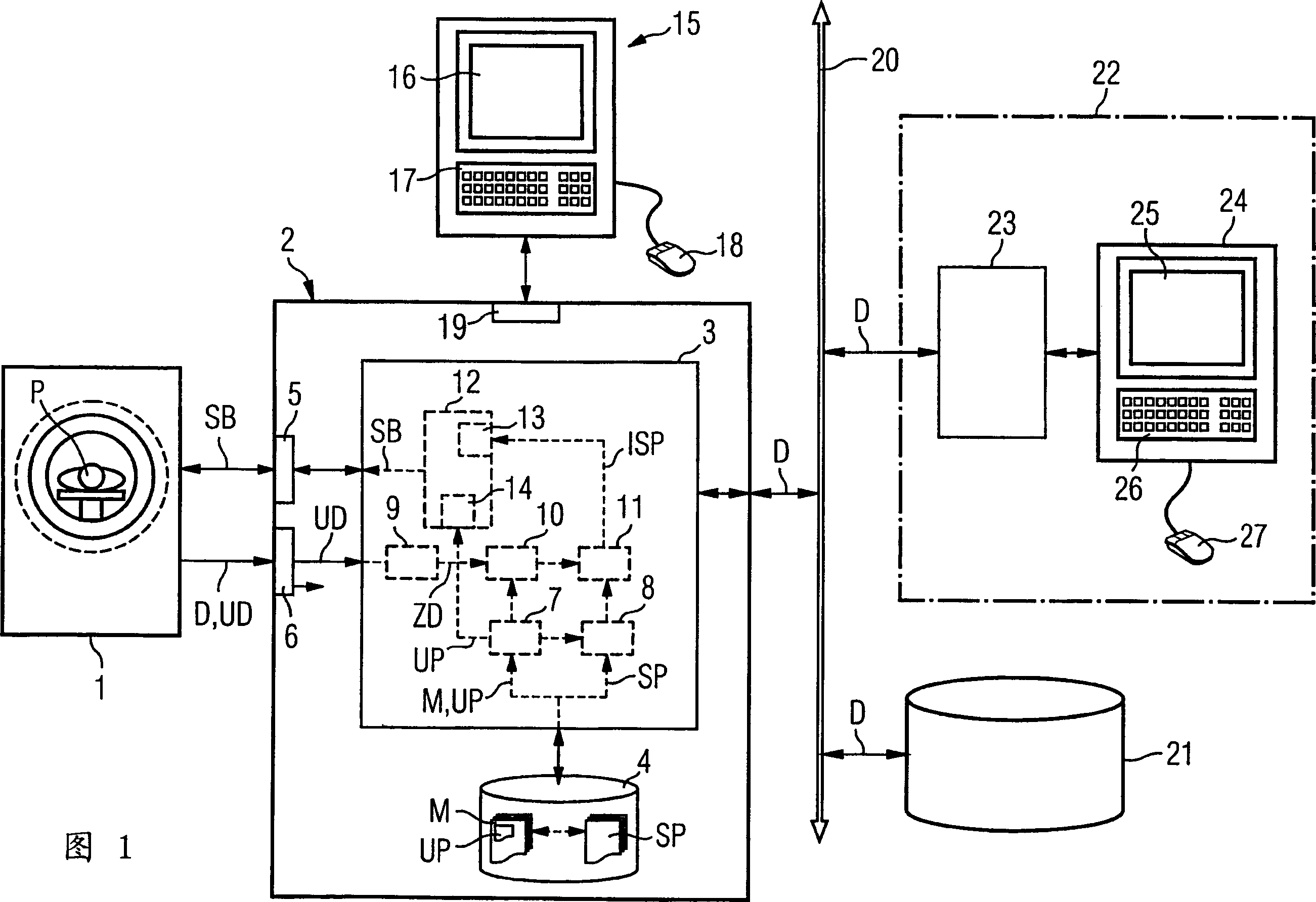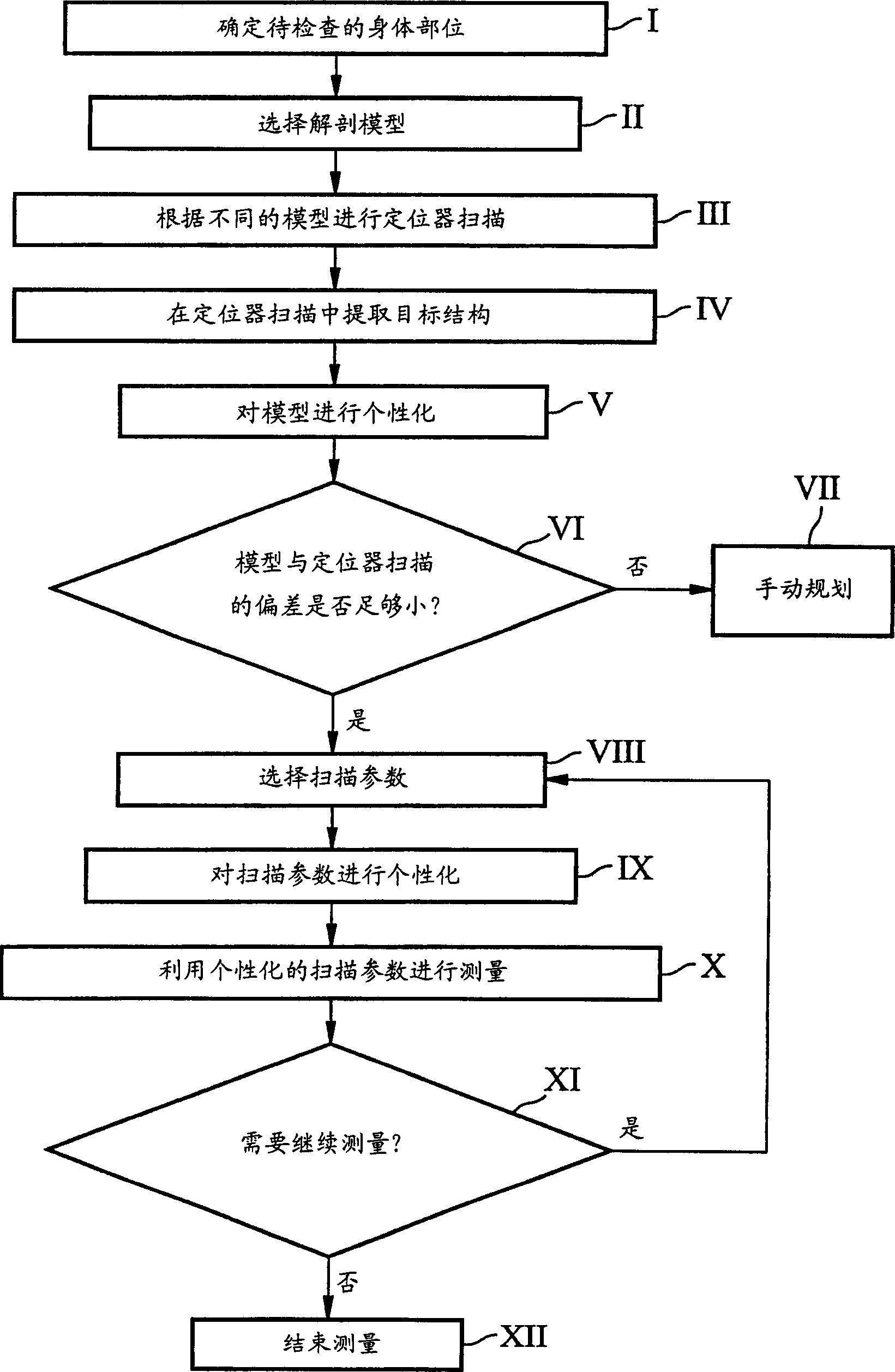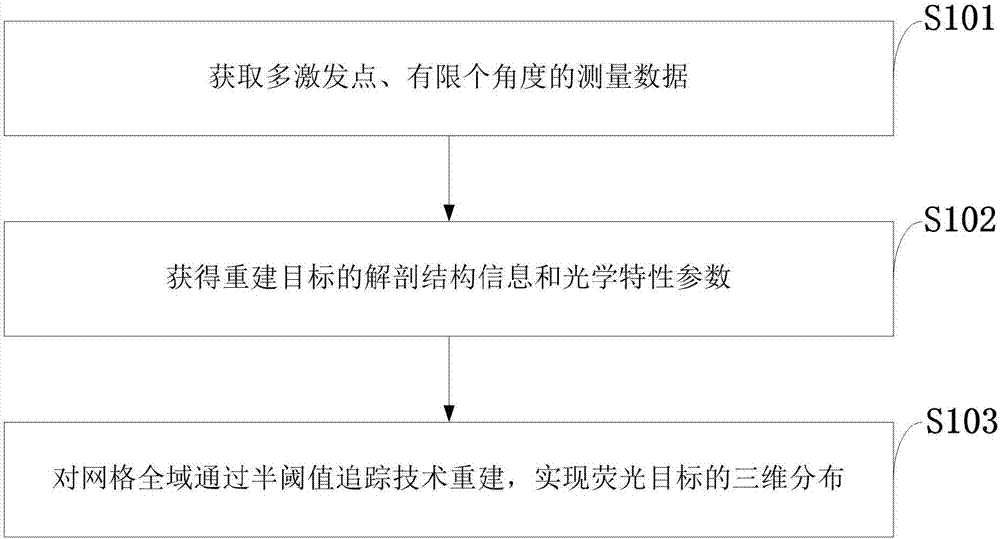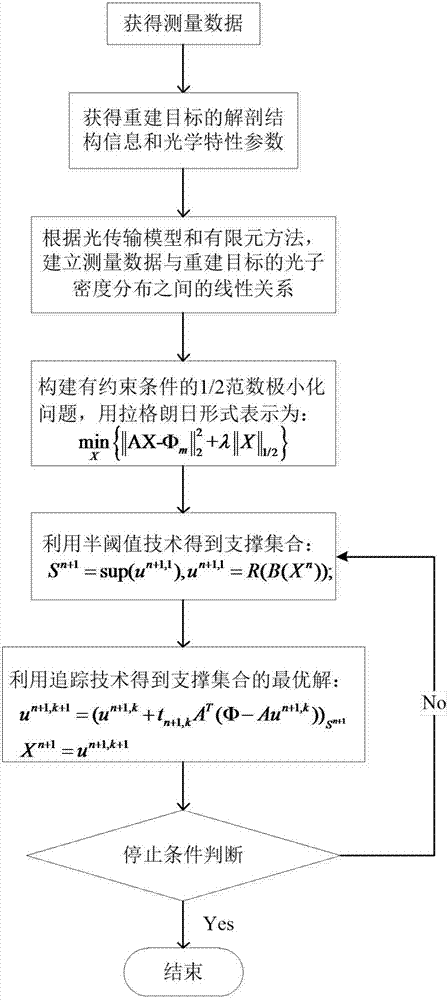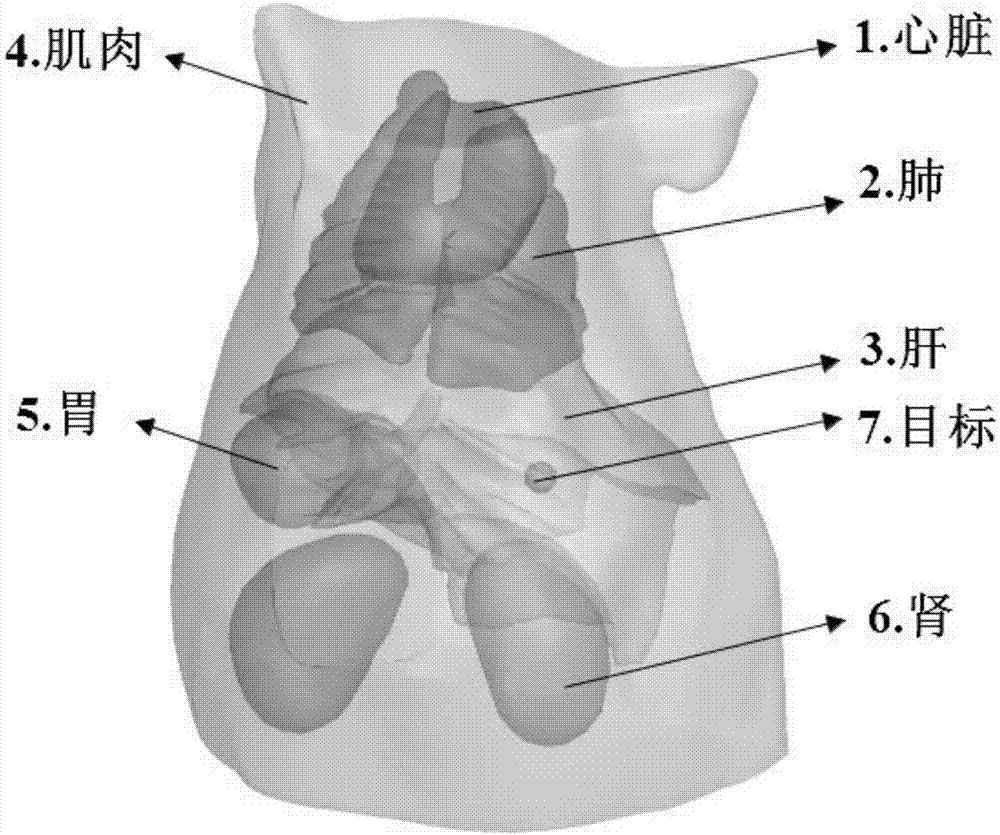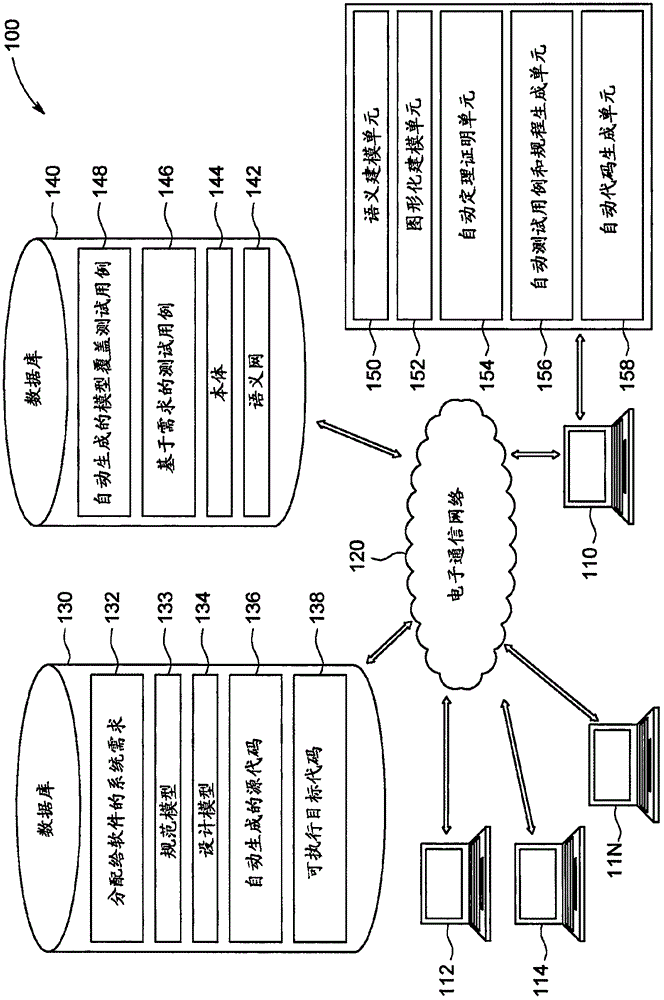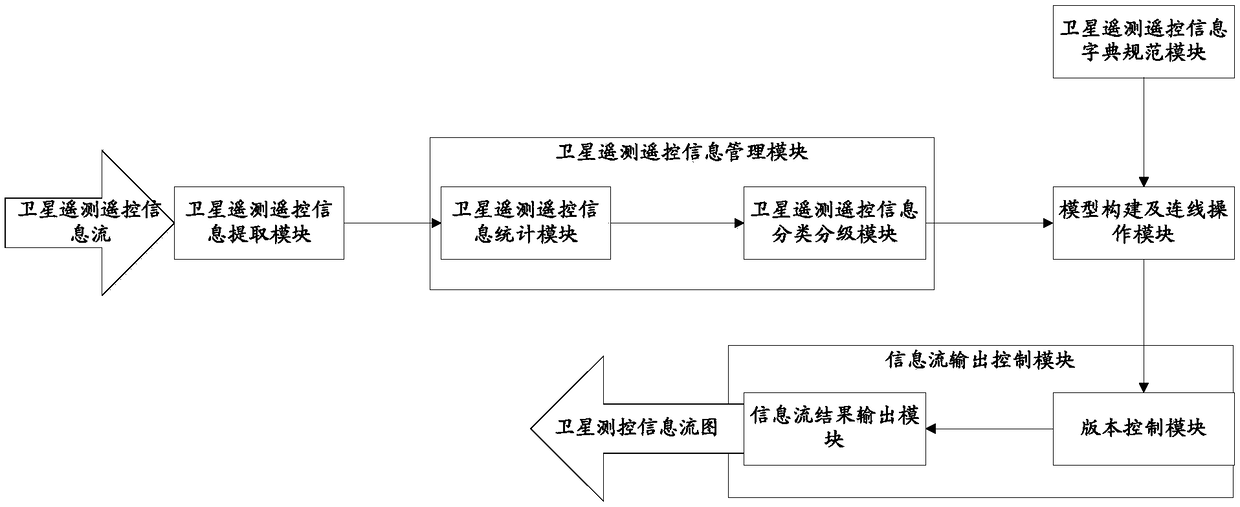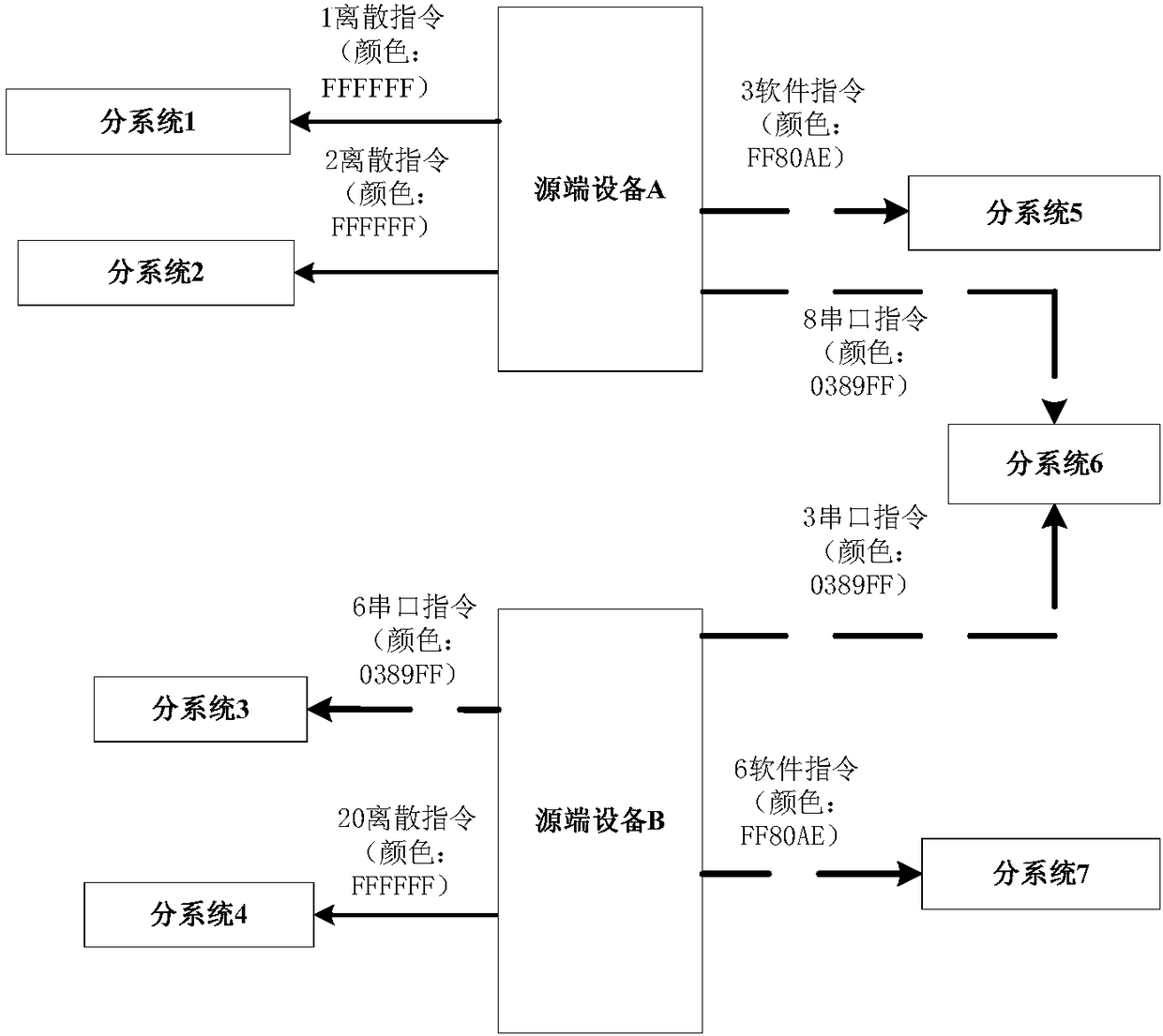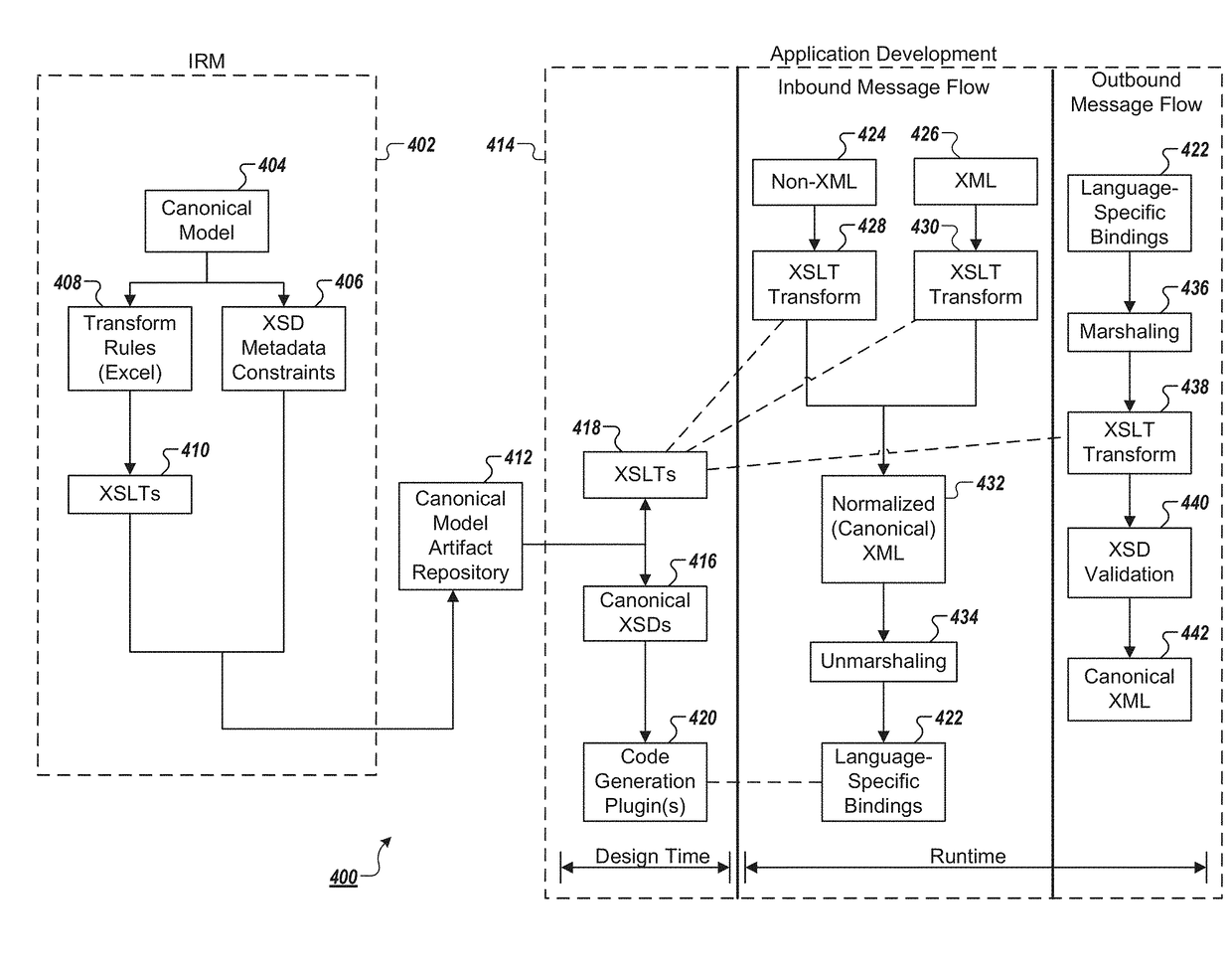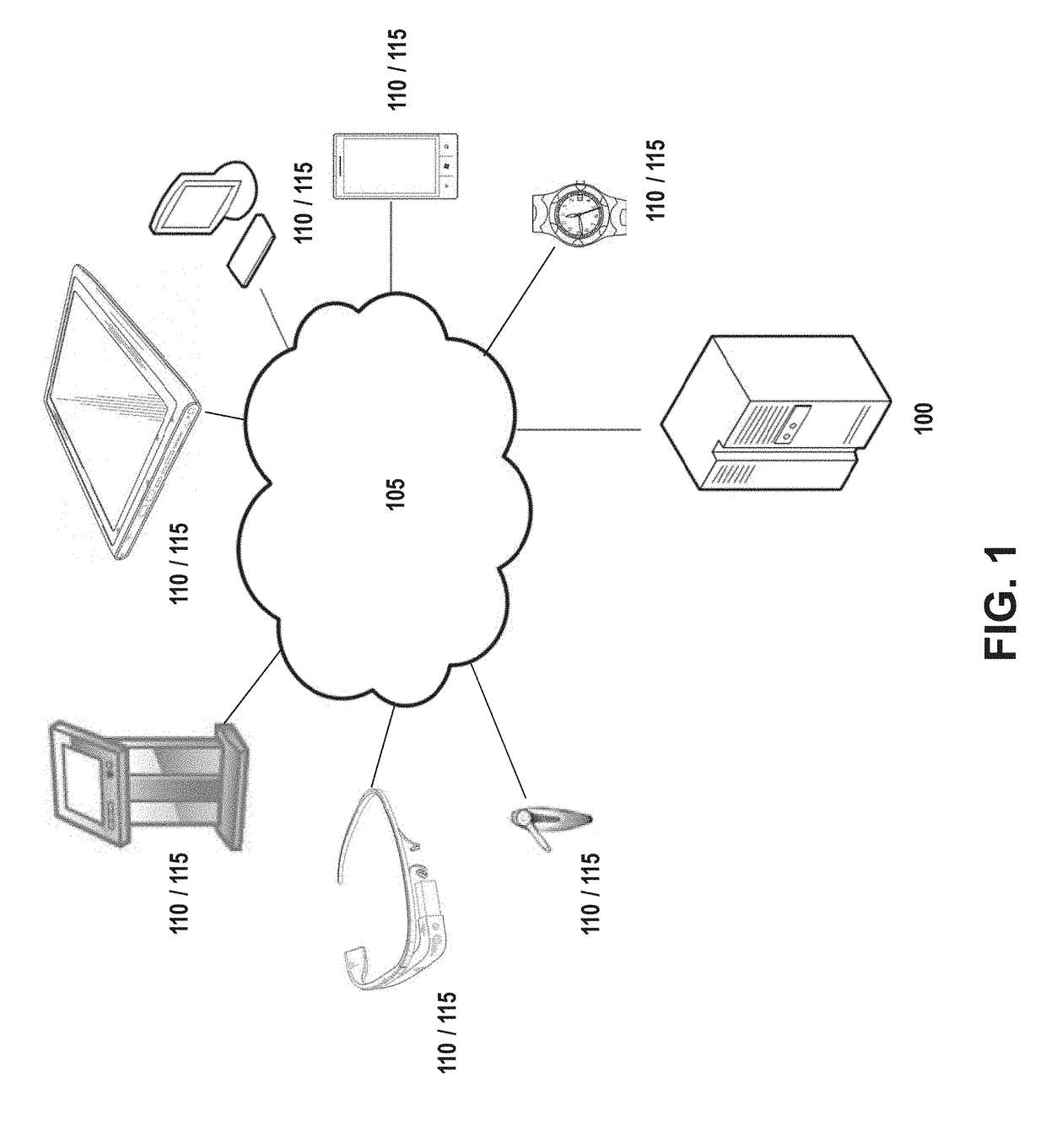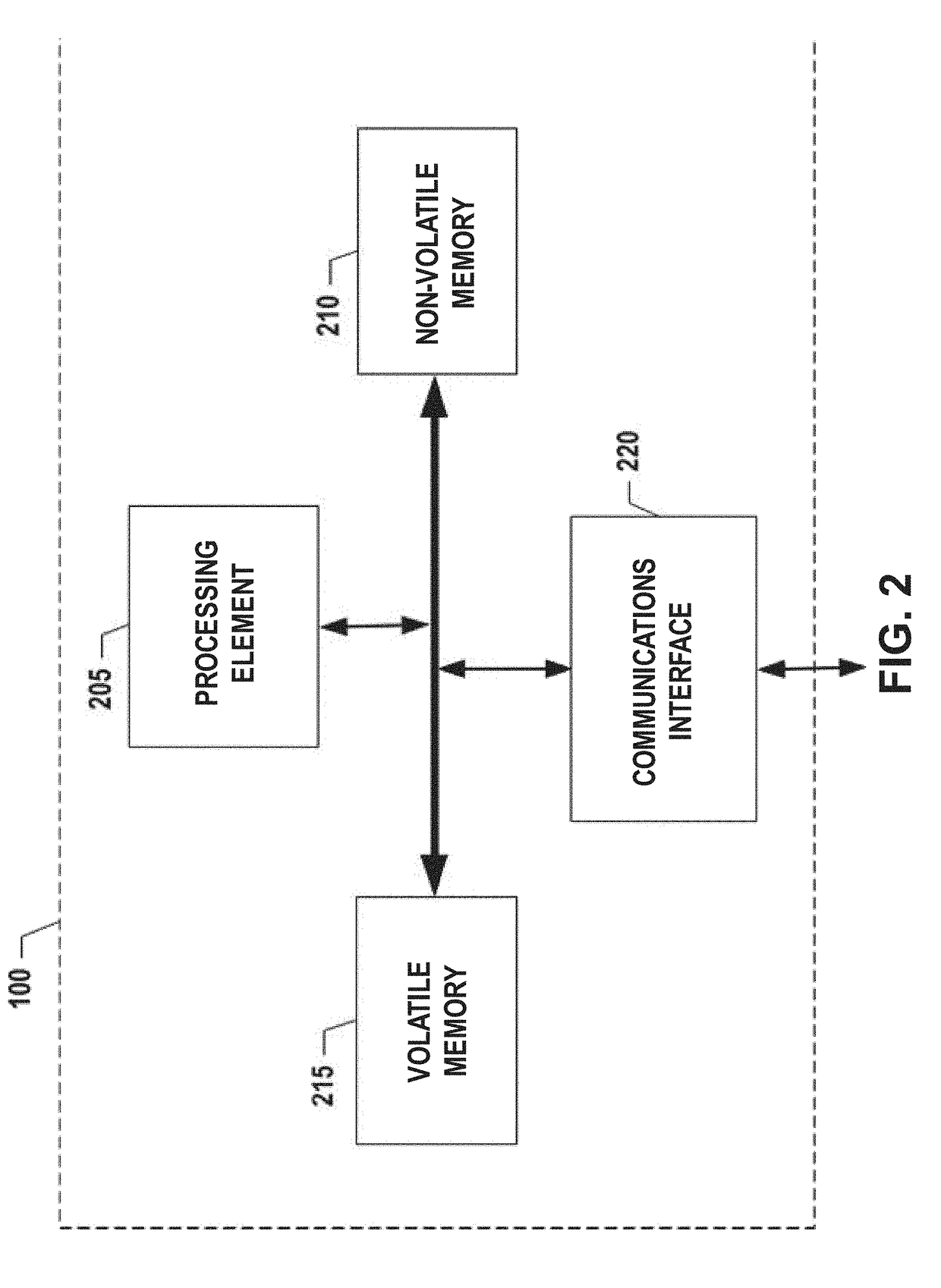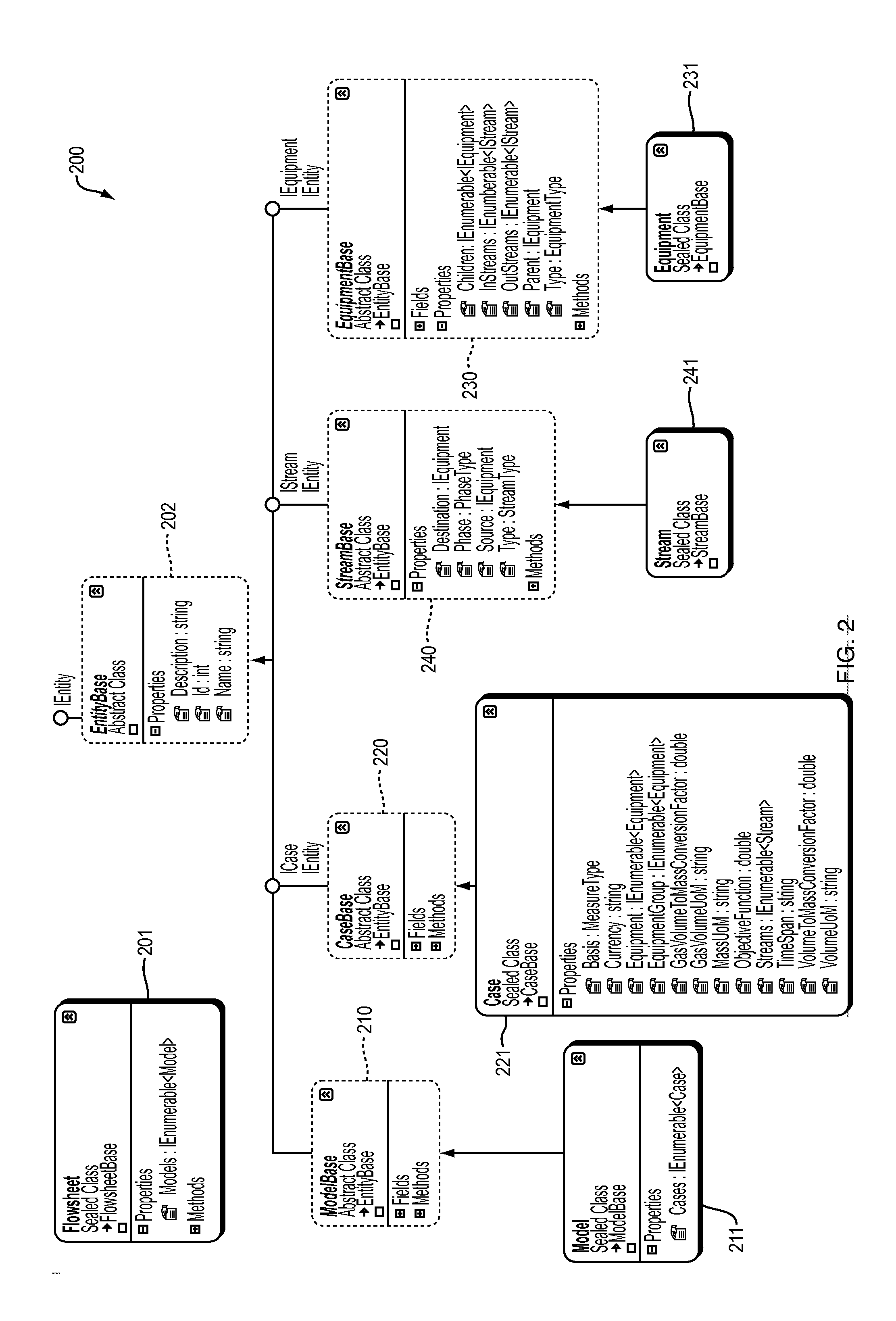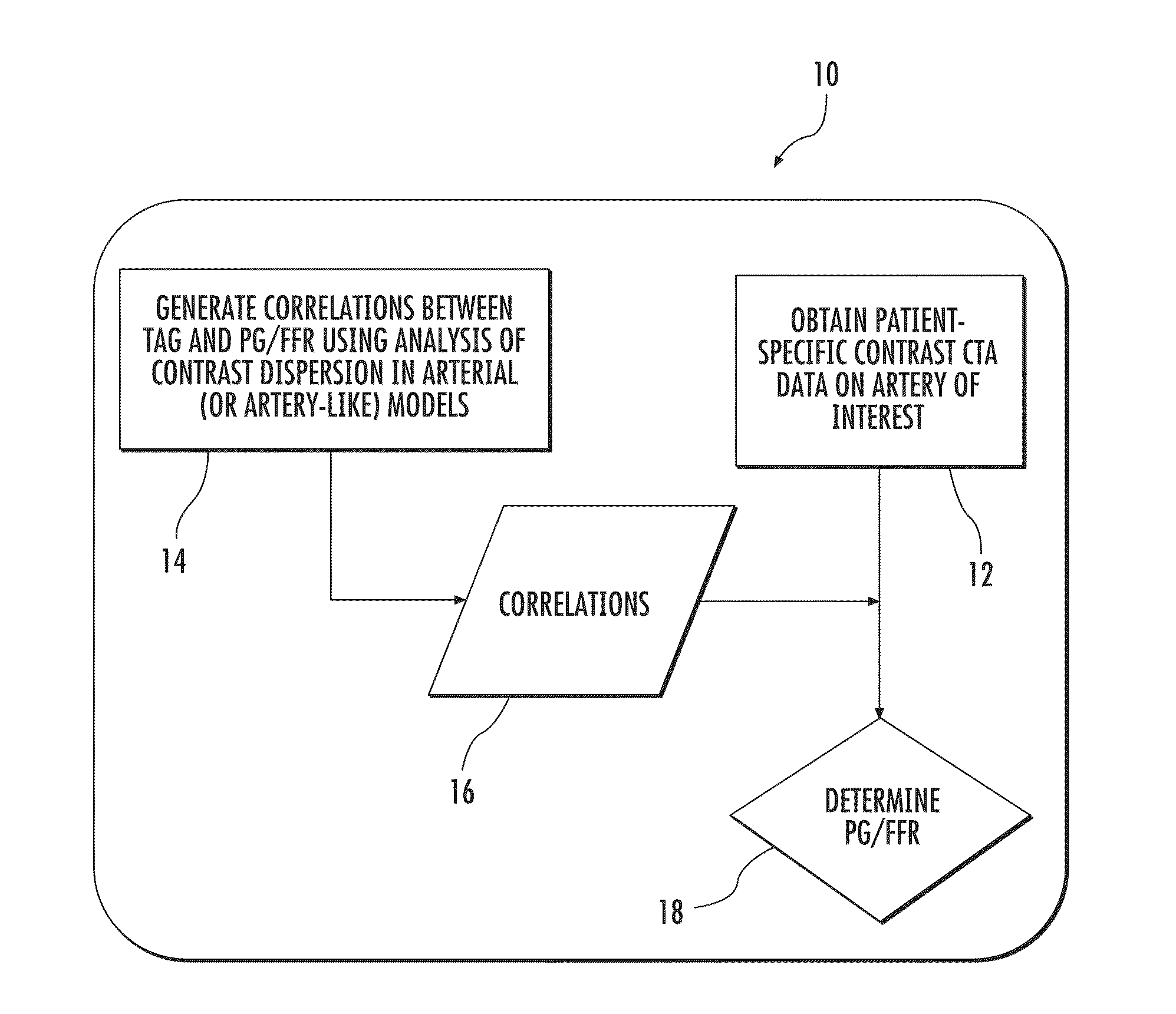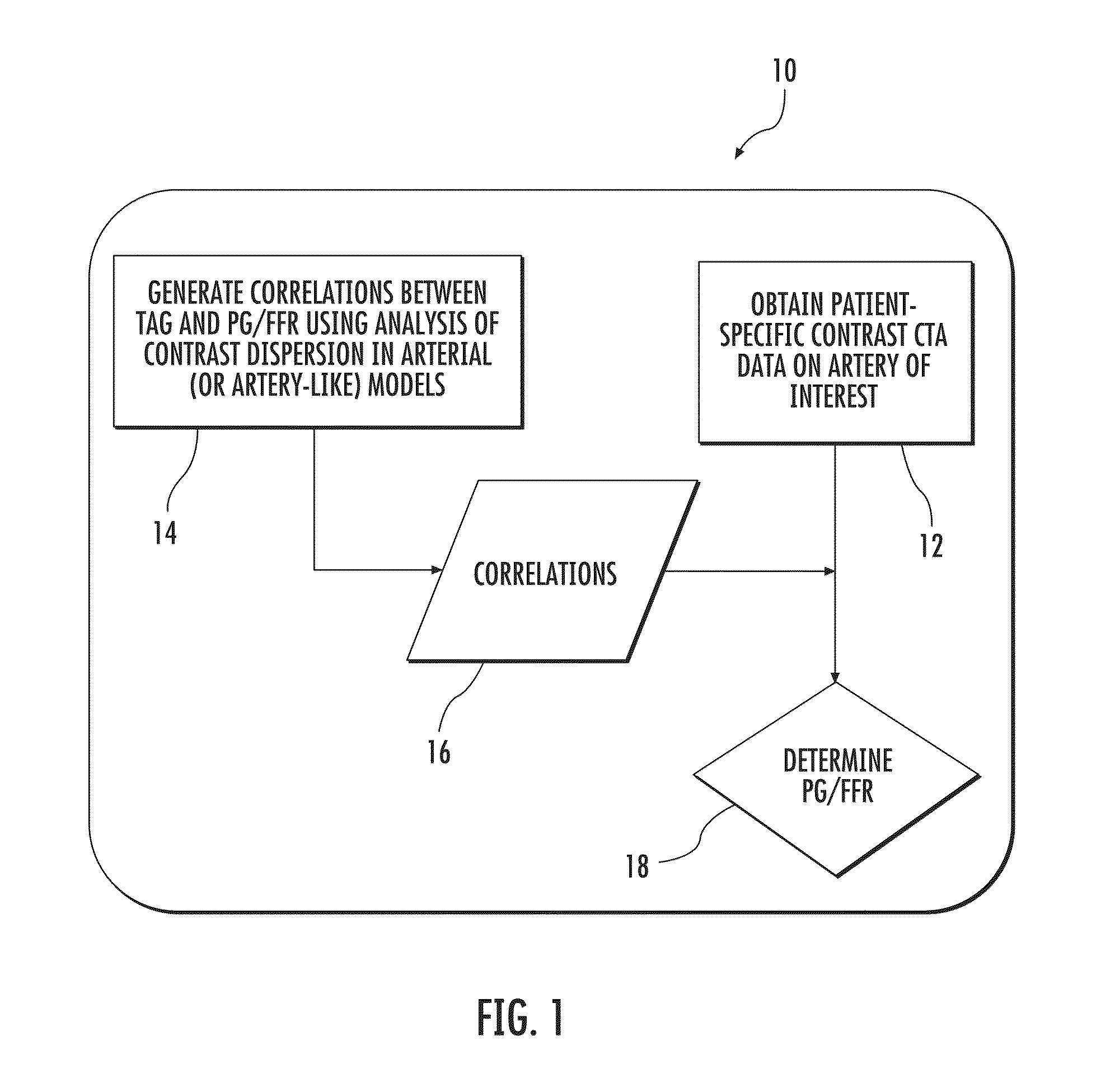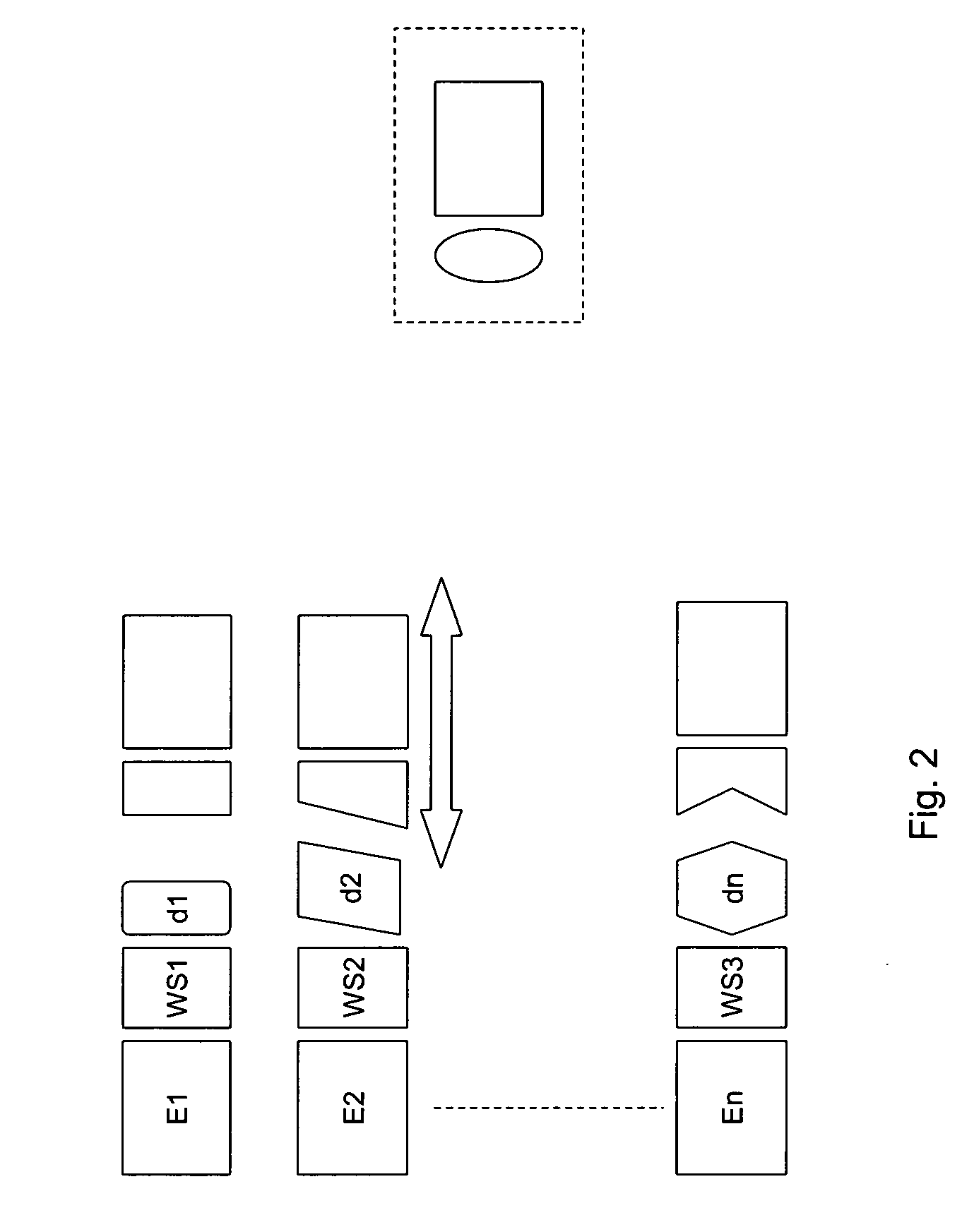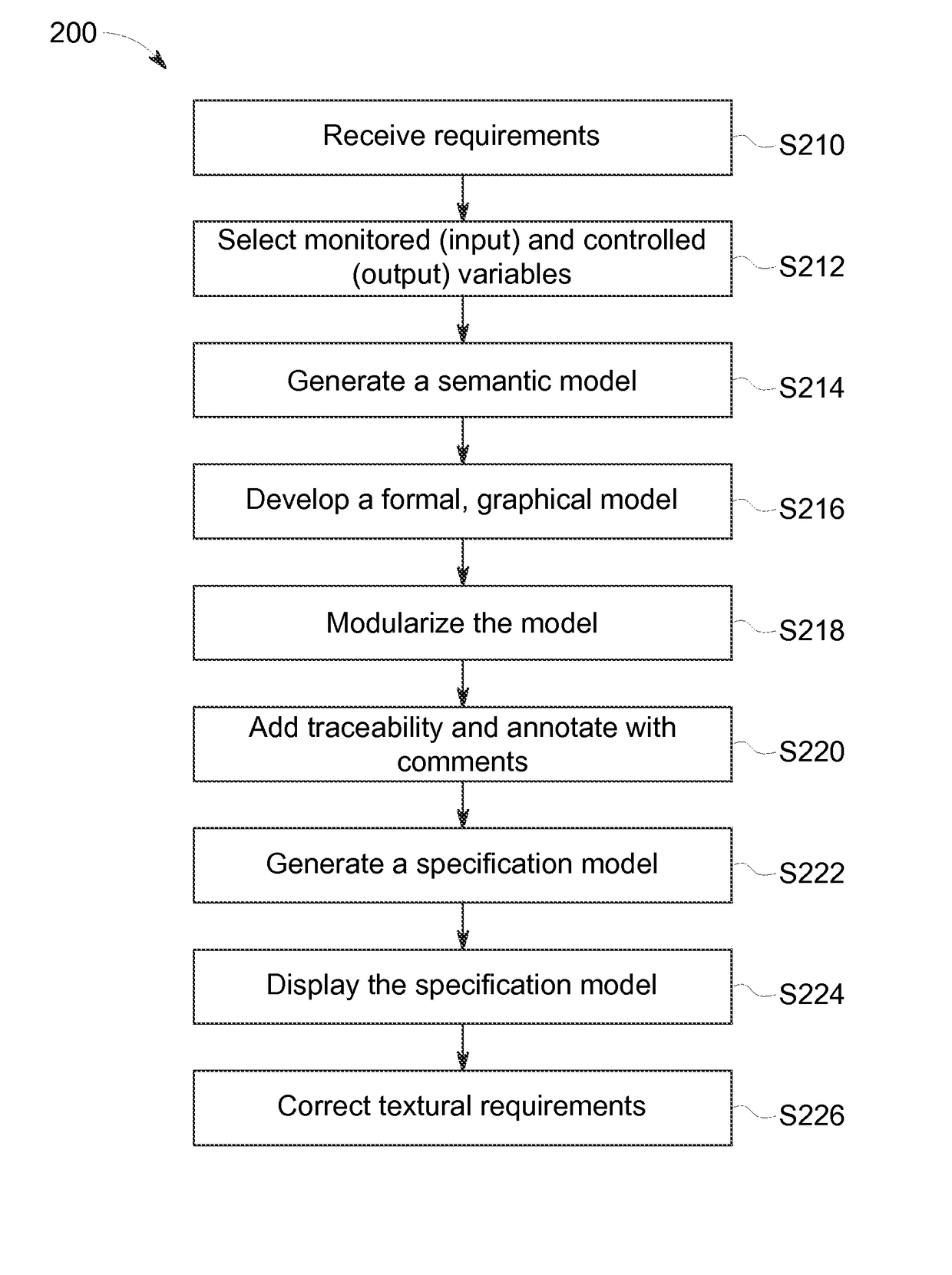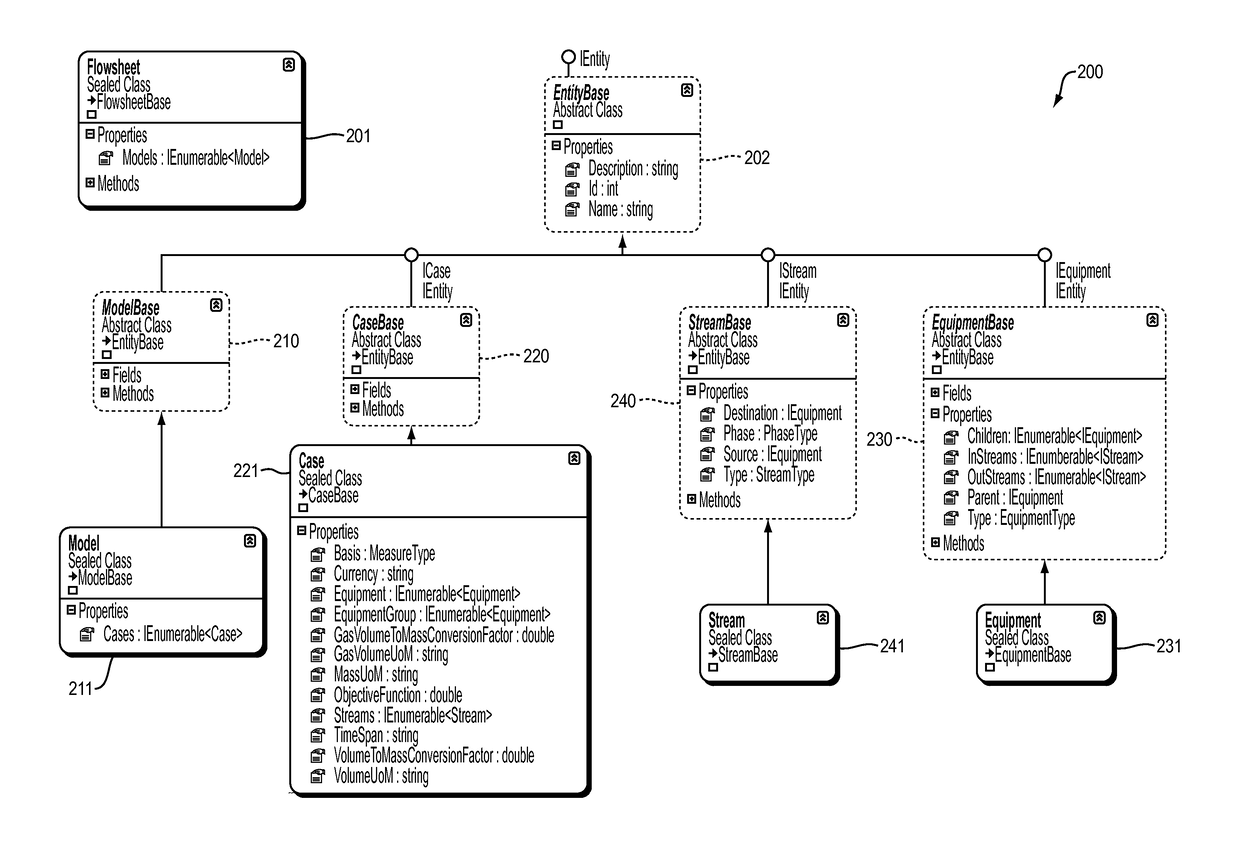Patents
Literature
Hiro is an intelligent assistant for R&D personnel, combined with Patent DNA, to facilitate innovative research.
44 results about "Canonical model" patented technology
Efficacy Topic
Property
Owner
Technical Advancement
Application Domain
Technology Topic
Technology Field Word
Patent Country/Region
Patent Type
Patent Status
Application Year
Inventor
A canonical model is a design pattern used to communicate between different data formats. Essentially: create a data model which is a superset of all the others ("canonical"), and create a "translator" module or layer to/from which all existing modules exchange data with other modules. The individual modules can then be considered endpoints on an intelligent bus; the bus centralises all the data-translation intelligence.
Method for the fast exploration of bus-based communication architectures at the cycle-count-accurate-at-transaction -boundaries (CCATB) abstraction
ActiveUS20060282233A1Speed up system prototypingMaintaining cycle count accuracyAnalogue computers for electric apparatusCAD circuit designComputer hardwareHardware architecture
A computer system simulation method starts with algorithmically implementing a specification model independently of hardware architecture. High level functional blocks representing hardware components are connected together using a bus architecture-independent generic channel. The bus architecture-independent generic channel is annotated with timing and protocol details to define an interface between the bus architecture-independent generic channel and functional blocks representing hardware components. The interface is refined to obtain a CCATB for communication space. The read( ) and write( ) interface calls are decomposed into several method calls which correspond to bus pins to obtain observable cycle accuracy for system debugging and validation and to obtain a cycle accurate model. The method calls are replaced by signals, and the functional blocks representing hardware components are further refined to obtain pin / cycle-accurate models which can be manually or automatically mapped to RTL, or be used to co-simulate with existing RTL components.
Owner:RGT UNIV OF CALIFORNIA
System and method for validating and visualizing APC assisted semiconductor manufacturing processes
InactiveUS20050010319A1High simulationOvercome deficienciesSemiconductor/solid-state device manufacturingSpecial data processing applicationsCanonical modelComputer science
A system and / or methodology that facilitates verifying and / or validating an APC assisted process via simulation is provided. The system comprises a film stack representation and a canonical model. The canonical model can predict process rates based at least in part upon an exposed material in the film stack representation. A solver component can also be provided to generate an updated recipe set-point according inputs and outputs of the canonical model.
Owner:BLUE CONTROL TECH
Collaborative Derivation Of An Interface And Partial Implementation Of
InactiveUS20080091720A1Simple technologyRequirement analysisSpecific program execution arrangementsControl flowCanonical model
A method, system and computer program product provide an implementation of software. A control flow of a software component is constructed based on a specification model. In various embodiments, the specification model comprises at least one input and at least one requirement referencing the at least one input. At least a partial implementation of the software component is generated based on the control flow and the at least one input and the at least one requirement of the specification model. In some embodiments, the specification model further comprises at least one output, and the at least a partial implementation of the software component is also based on the at least one output.
Owner:IBM CORP
Image blind deblurring method based on edge self-adaption
The invention discloses an image blind deblurring method based on edge self-adaption. To solve the problems that as for an existing total variation deblurring algorithm, edges and details of images are easily blurred, a de-mean gradient total variation canonical model is built, weighting coefficients are calculated in an iterated mode by means of local variance self-adaption of gradients of the images, and the ability of the deblurring algorithm to restore the edges and the details of the images. The image blind deblurring method comprises the following steps that (1) a blurred image is input, solutions to a gradient-region clear image and a blurring kernel are obtained alternately, and the initial blurring kernel of the blurred image is obtained; (2) the initial blurring kernel is used for conducting primary non-blind deblurring on the blurred image, and an initial clear image is obtained; (3) clustering is conducted on the initial clear image, the mean value and the weighting coefficient in the de-mean canonical model are updated, and a solution to the blurring kernel is obtained again; (4) the new blurring kernel is used for conducting secondary non-blind deblurring so as to obtain a clear image. Experimental results show that the image blind deblurring method based on edge self-adaption has better deburring effect than the prior art and can be used for image restoration.
Owner:XIDIAN UNIV
Method for the fast exploration of bus-based communication architectures at the cycle-count-accurate-at-transaction-boundaries (CCATB) abstraction
ActiveUS7778815B2Quick levelingSpeedAnalogue computers for electric apparatusCAD circuit designComputer hardwareHardware architecture
Owner:RGT UNIV OF CALIFORNIA
Automatic design apparatus, automatic design method, and automatic design program of digital circuit
InactiveUS20070179639A1Reduce problem sizeLink editingSimulator controlCanonical modelTheoretical computer science
An automatic digital-circuit design apparatus receives a control target model written in a design description language, generates a control target model represented by a finite state machine model, stores the generated control target model, receives a control specification model written in a design description language, generates a control specification model represented by a finite state machine model, stores the generated control specification model, generates a control apparatus synthesis model by composing the generated control target model and the generated control specification model, computes controllable simulation relation, stores the computed controllable simulation relation, determines whether the control apparatus synthesis model is a model capable of providing the control, generates a permissible operation model, stores the generated permissible operation model, determines a control rule, generates a control apparatus model represented by a finite state machine, and converts the control apparatus model to a control apparatus model written in a design description language.
Owner:KK TOSHIBA
Systematic generation of scenarios from specification sheet
InactiveUS20070261012A1Detecting faulty computer hardwareAnalogue computers for electric apparatusCanonical modelTheoretical computer science
A method of generating a scenario includes generating a specification model by describing a specification in a predetermined descriptive language, extracting a plurality of operations from the specification model, generating a plurality of operation descriptions, each of which corresponds to one of the operations and includes an operation name and a constraint condition, generating at least one cause-effect graph that combines the operations based on the operation descriptions, and extracting as a scenario a series of operations from the cause-effect graph.
Owner:FUJITSU LTD
Canonical model to normalize disparate persistent data sources
InactiveUS20080306970A1Digital data information retrievalDigital computer detailsCanonical modelTransaction log
A semantic database transaction monitor is provided that monitors database transactions by taking advantage of database replication technology. The invention receives one or more event streams of transaction data from one or more database replication software agents, originally from transaction logs, and then classifies each transaction, utilizing an inference engine populated with one or more source ontologies and a canonical ontology so that transaction metadata are normalized. The invention then can be utilized to create a data store across multiple databases for reporting and analysis. The invention can also be used to feed normalized database transactions to real-time graphics software for real-time reporting or alerting. Because the process obtains data from event streams, it does not significantly drain the resources of the databases and can provide virtually real-time monitoring. Moreover, it does not require recoding for updates to the databases, but only changes to the ontologies read at runtime.
Owner:INT BUSINESS MASCH CORP
Method for realizing large-scale Web3D model loading and presentation of data center
PendingCN110503709AEasy loadingEasy to present3D-image rendering3D modellingCanonical modelData center
The invention discloses a method for realizing large-scale Web3D model loading and presentation of a data center. The method comprises the following steps: (1) standardizing the manufacturing processof a model, including material acquisition specification, model manufacturing specification, map manufacturing specification, scene collapse specification and the like; (2) formulating a standard model loading process which comprises the steps of acquiring model equipment information, analyzing the model equipment information, and compiling a standard WebGL loading function to load the model; (3)designing a classification scene loading algorithm which comprises the following steps: dividing a large-scale data center scene into different areas, compressing, transmitting and loading a model file after scene division to the local, decompressing the model file, and storing the decompressed model file; using a WebGL loading function to load a model, firstly loading a main scene model, and loading the model in a corresponding sub-region only when being clicked. By utilizing the method, large-scale equipment models can be loaded in data center display, and the difficulty and the time lengthof loading large-batch models at one time are reduced.
Owner:HANGZHOU NORMAL UNIVERSITY
Method and system of software specification modeling
According to some embodiments, a system includes a communication device operative to communicate with a user to obtain the one or more requirements associated with a specification model for a semantic module; a semantic module to receive the one or more requirements, store the one or more requirements and transform the one or more requirements into a semantic model; a specification module to receive the semantic model, store the semantic model, translate the semantic model and generate a specification model; a memory for storing program instructions; at least one specification model platform processor, coupled to the memory, and in communication with the specification module and the semantic module and operative to execute program instructions to: transform the one or more requirements into a semantic model by executing the semantic module; translate the semantic model into a graphical model by executing the specification module; and modify the graphical model by executing the specification module to generate the specification model; and generate a specification model that is human-readable and computer-readable for use in software design. Numerous other aspects are provided.
Owner:GENERAL ELECTRIC CO
Deep learning model file conversion method and system, computer equipment and computer readable storage medium
The invention discloses a deep learning model file conversion method and system, computer equipment and a computer readable storage medium, and the method comprises the following steps: receiving a to-be-converted model file obtained under an original deep learning framework; according to the file type of the to-be-converted model file, selecting a corresponding readable framework to read the to-be-converted model file so as to obtain loading information of the to-be-converted model file; analyzing and / or translating the loaded information to obtain intermediate standard information; integrating into an intermediate specification model file according to the information of the intermediate specification; the intermediate specification model file is opened through the target deep learning framework, the storage engine of the target deep learning framework is started to store the obtained intermediate specification model file as the target model file, and the target model file can be applied to the target deep learning framework, so that the application environment of the target model file is expanded.
Owner:ONE CONNECT SMART TECH CO LTD SHENZHEN
Method and apparatus for an automated input/output buffer information specification model generator
A method for automating input / output buffer information specification (IBIS) model generation. A wrapper utility combines components into an automated generation flow to model multiple input / output (I / O) buffers that conform to single-ended and differential I / O standards. Configuration data files are imported to properly configure the modeled I / O buffers according to a specific set of signal parameters across all process corners. Output and input termination impedance may also be modeled within the I / O buffer. A simulation setup file of the modeled I / O buffer is generated to determine the voltage / current (V / I) and voltage / time (V / T) data for the modeled I / O buffer for each process corner. A raw IBIS model is then created, formatted, and validated to determine the accuracy of the IBIS model. Execution steps of the IBIS model generator are then iterated to automatically generate, correlate, and compile IBIS models for each I / O standard into a single file.
Owner:XILINX INC
Method and control device to operate a magnetic resonance tomography apparatus
InactiveCN1654009AMagnetic property measurementsDiagnostic recording/measuringPattern recognitionPersonalization
Owner:SIEMENS AG
Semantically mediated access to knowledge
ActiveUS9201905B1Digital data processing detailsDatabase distribution/replicationInformation typeCanonical model
The different advantageous embodiments provide a system for positioning data within a network comprising a knowledge manager, a canonical model manager, and a context manager. The knowledge manager is configured to process a query across a number of resources to generate a result. The canonical model manager includes a number of models used to identify relationships between types of information within the number of resources and the query. The context manager is configured to manage the context of the query and the relationships identified by the canonical model manager to position the number of resources for access by the knowledge manager.
Owner:THE BOEING CO
Apparatus, System, and Method for Identifying Redundancy and Consolidation Opportunities in Databases and Application Systems
ActiveUS20110055167A1Digital data information retrievalDigital data processing detailsCluster algorithmCanonical model
Apparatuses, computer program products, and methods for identifying redundancy and consolidation opportunities in databases and application systems are disclosed. In one embodiment, the apparatus may include at least one meta data scanner. The apparatus may also include an enterprise meta data source. The apparatus may further include a meta data repository. The meta data repository receives system-specific meta data from the at least one meta data scanner. The meta data repository may also receive enterprise canonical data model meta data from the enterprise meta data source. The meta data repository may be configured to generate at least one individual system CRUD matrix that may then used to produce an enterprise canonical model CRUD matrix. The enterprise canonical model CRUD matrix may be analyzed by a data mining clustering algorithm. The clustering algorithm may group together modules and database elements that may be redundant and may indicate opportunities for consolidation.
Owner:OPTUMINSIGHT
Method for reconstructing fluorescence molecular tomography based on semi-threshold tracking algorithm
InactiveCN107220961AImprove stabilityThe reconstruction results are accurateImage enhancementDiagnostics using fluorescence emissionAnatomical structuresCanonical model
The invention belongs to the technical field of molecular imaging, and discloses a method for reconstructing fluorescence molecular tomography based on semi-threshold tracking algorithm. The multi-point excitation and finite angle measurement are used to construct a sparse canonical model of a non-convex problem, and the linear relationship between the surface measurement data and fluorescence target distribution is established. The linear relationship is transformed into the 1 / 2 norm minimization problem to solve and obtain the three-dimensional distribution and concentration of the fluorescent targets within a reconstructed target. The model is solved by threshold iteration and matching tracing algorithm. The method reduces the morbidity of the problem. Optical characteristic parameters and the anatomical structure information are used as a priori knowledge to improve the accuracy of the reconstruction result and the quality of a reconstructed image. The reconstruction problem is transformed into a 1 / 2-norm minimization problem with constraint conditions and is solved by using the semi-threshold tracing algorithm, which makes the solution satisfy the minimum of 1 / 2- norm and guarantees the robustness of the reconstruction problem to the parameters and the acceleration reconstruction time.
Owner:NORTHWEST UNIV(CN)
Automation of canonical model usage in application development processes
ActiveUS20160371060A1Reduce the burden onImprove consistencyInterprogram communicationCode refactoringCanonical modelApplication software
Computer program products, methods, systems, apparatuses, and computing entities are provided for enforcing usage of a canonical model. For example, machine-automatable artifacts that express the canonical model using a set of metadata constraints and a set of transformation rules can be received from a canonical model artifact repository. These machine-automatable artifacts can be converted into language-specific bindings and applications can subsequently utilize those language-specific bindings to enforce conformity to the canonical model.
Owner:UNITED PARCEL SERVICE OF AMERICAN INC
System and method for model based technology and process for safety-critical software development
ActiveCN106528100ANatural language analysisSoftware testing/debuggingFormal requirementsCanonical model
A method for model-based design of safety-critical software is disclosed. The method includes receiving natural-language software requirements, developing a specification model by implementing either semantic modeling or graphical modeling, applying formal requirements analysis to the specification model, auto generating requirements based and robustness test cases from the specification model, developing a design model based on the specification model, applying test cases to the design model, auto-generating source code using the design model, verifying the source code using both test cases and static analysis technology, and compiling executable object code from the verified source code. If a result of the analysis of the software specification or design models is not satisfactory then adjusting the specification or design model to correct any inconsistency, and repeating applying the analysis and test cases. A system for implementing the model-based design and a non-transitory computer readable medium are disclosed.
Owner:GENERAL ELECTRIC CO
Design system and fault information quick positioning method for intellectualizing satellite measurement and control information stream based on model
ActiveCN108416151ALess man-hoursFaster turnaroundSpecial data processing applicationsCanonical modelRemote control
The invention relates to a design system and fault information quick positioning method for intellectualizing a satellite measurement and control information stream based on a model. Satellite remotemeasurement and remote control information is extracted from the satellite remote measurement and remote control information stream. The information comprises remote measurement and remote control source terminal equipment information, remote measurement and remote control type information and remote measurement and remote control target equipment information; remote measurement and remote controlnumber information is counted by using a satellite remote measurement and remote control information counting module; then remote measurement and remote control information is classified and graded through a satellite remote measurement and remote control information classification and grading module; a standard model and standard linear information in a satellite remote measurement and remote control information dictionary standard module are called, and the modelling pattern design work of the satellite remote measurement and remote control information stream is completed in a model establishment and line connection operation module; different versions are stored in a version control module; finally, a module output design result is output by using an information stream result. The whole process of intellectualized seamless design of the spacecraft information stream is achieved, the design process is standardized, and the total design capacity is improved.
Owner:CHINA ACADEMY OF SPACE TECHNOLOGY
Apparatus, system, and method for identifying redundancy and consolidation opportunities in databases and application systems
ActiveUS8364651B2Digital data information retrievalDigital data processing detailsCluster algorithmCanonical model
Apparatuses, computer program products, and methods for identifying redundancy and consolidation opportunities in databases and application systems are disclosed. In one embodiment, the apparatus may include at least one meta data scanner. The apparatus may also include an enterprise meta data source. The apparatus may further include a meta data repository. The meta data repository receives system-specific meta data from the at least one meta data scanner. The meta data repository may also receive enterprise canonical data model meta data from the enterprise meta data source. The meta data repository may be configured to generate at least one individual system CRUD matrix that may then used to produce an enterprise canonical model CRUD matrix. The enterprise canonical model CRUD matrix may be analyzed by a data mining clustering algorithm. The clustering algorithm may group together modules and database elements that may be redundant and may indicate opportunities for consolidation.
Owner:OPTUMINSIGHT
Stream transmission method for three-dimension model facing mobile terminal
InactiveCN103260030AImprove Topology Compression RatioImprove geometry compressionTelevision systemsDigital video signal modificationCanonical modelTree code
The invention discloses a stream transmission method for a three-dimension model facing a mobile terminal. The method comprises the steps of conducting global parameterization on the three-dimension model by utilization of the MAPS algorithm, partitioning the three-dimension model into geometrical information, parameter information and connectedness information, and building a self-adaptive approximate semi-canonical model; then conducting inverse improved loop small wave conversion on the semi-canonical model to obtain a base grid and side-play mount, conducting zero-tree coding on the side-play mount to further conduct entropy coding, and based on a mobile terminal platform, compressing the base grid through single resolution based on the edge breaker algorithm; finally decoding through the inverse process simplified by the grid, and drawing an original model. The stream transmission method is moderate in calculated amount and high in decompression speed, is mainly applied to a PC on a mobile network to transmit complex three-dimension model to the mobile terminal, and improves the topology compression ratio and the geometry compression ratio to a certain degree.
Owner:SOUTHEAST UNIV
Systematic generation of scenarios from specification sheet
InactiveUS7904843B2Analogue computers for electric apparatusDetecting faulty computer hardwareCanonical modelTheoretical computer science
A method of generating a scenario includes generating a specification model by describing a specification in a predetermined descriptive language, extracting a plurality of operations from the specification model, generating a plurality of operation descriptions, each of which corresponds to one of the operations and includes an operation name and a constraint condition, generating at least one cause-effect graph that combines the operations based on the operation descriptions, and extracting as a scenario a series of operations from the cause-effect graph.
Owner:FUJITSU LTD
Capacitance extraction for advanced device technologies
ActiveUS8522181B2Computer aided designSoftware simulation/interpretation/emulationCapacitanceCanonical model
A technology specific information to design the integrated circuit is received. A plurality of canonical hierarchical models to capture an integrated circuit capacitance are created. The plurality of canonical hierarchical models includes at least a canonical model to capture a capacitance of a device having a plurality of conductors, and a canonical model to capture a capacitance between at least a portion of the device and one or more other conductors of the integrated circuit. The canonical hierarchical models can be applied to a layout of the integrated circuit. A capacitance for the layout can be determined based on the canonical hierarchical models.
Owner:SYNOPSYS INC
Automation of canonical model usage in application development processes
ActiveUS20180136911A1Reduce the burden onImprove consistencyInterprogram communicationCode refactoringCanonical modelApplication software
Computer program products, methods, systems, apparatuses, and computing entities are provided for enforcing usage of a canonical model. For example, machine-automatable artifacts that express the canonical model using a set of metadata constraints and a set of transformation rules can be received from a canonical model artifact repository. These machine-automatable artifacts can be converted into language-specific bindings and applications can subsequently utilize those language-specific bindings to enforce conformity to the canonical model.
Owner:UNITED PARCEL SERVICE OF AMERICAN INC
Computer Method And Apparatus Converting Process Engineering Application Data Into A Canonical Flowsheet Representation
Process engineering software applications have respective proprietary in nature and disconnected model representations of a manufacturing or processing facility. The invention method and apparatus extract from the various applications topology of equipment and streams for a facility. From the extracted data, a convertor or adapter of the invention system derives a common canonical model. To support the common canonical model (e.g., a Flowsheet object in embodiments), the converter / adapter maps or associates one or more physical assets to a logical asset, and arranges a working hierarchy of assets that can be navigated, queried and filtered.
Owner:ASPENTECH CORP
Method for Estimating Pressure Gradients and Fractional Flow Reserve from Computed Tomography Angiography: Transluminal Attenuation Flow Encoding
InactiveUS20140180080A1Radiation diagnosis data transmissionHealth-index calculationUltrasound attenuationCoronary arteries
An embodiment in accordance with the present invention provides a method for non-invasively determining the functional severity of coronary artery stenosis. The method includes gathering patient-specific data related to concentration of a contrast agent within a coronary artery of a patient using a coronary computed tomography angiography scan (CCTA). The patient-specific data is used to calculate a patient-specific transarterial attenuation gradient for the coronary artery of the patient. The patient specific transarterial attenuation gradient is compared to previously collected data to determine an estimate of a pressure gradient and / or fractional flow reserve (FFR) for the patient. As more data is collected, the data can be added to the database in order to increase the accuracy of future assessments. The database can also be enhanced by adding data generated by canonical models and mathematical analysis.
Owner:THE JOHN HOPKINS UNIV SCHOOL OF MEDICINE
Protocol mediation for adaptation in semantic web services
InactiveUS20070011325A1Digital computer detailsOffice automationCanonical modelSemantic web services
A method of invoking a web service comprising the steps of: generating a generic client module for requesting web services, the generic module being adapted to output commands invoking web services in conformity with a canonical model of commercial activities in a given commercial domain; and generating, from the canonical model and information relating to a syntax used to invoke web services at an enterprise, an adaptation module, adapted to receive commands output by the generic module, and express those commands as one or more commands having a syntax by which web services may be directly invoked at the enterprise.
Owner:HEWLETT PACKARD DEV CO LP
Method and system of software specification modeling
Owner:GENERAL ELECTRIC CO
Efficient Blind Image Deblurring Method Based on Edge Adaptation
The invention discloses an image blind deblurring method based on edge self-adaption. To solve the problems that as for an existing total variation deblurring algorithm, edges and details of images are easily blurred, a de-mean gradient total variation canonical model is built, weighting coefficients are calculated in an iterated mode by means of local variance self-adaption of gradients of the images, and the ability of the deblurring algorithm to restore the edges and the details of the images. The image blind deblurring method comprises the following steps that (1) a blurred image is input, solutions to a gradient-region clear image and a blurring kernel are obtained alternately, and the initial blurring kernel of the blurred image is obtained; (2) the initial blurring kernel is used for conducting primary non-blind deblurring on the blurred image, and an initial clear image is obtained; (3) clustering is conducted on the initial clear image, the mean value and the weighting coefficient in the de-mean canonical model are updated, and a solution to the blurring kernel is obtained again; (4) the new blurring kernel is used for conducting secondary non-blind deblurring so as to obtain a clear image. Experimental results show that the image blind deblurring method based on edge self-adaption has better deburring effect than the prior art and can be used for image restoration.
Owner:XIDIAN UNIV
Features
- R&D
- Intellectual Property
- Life Sciences
- Materials
- Tech Scout
Why Patsnap Eureka
- Unparalleled Data Quality
- Higher Quality Content
- 60% Fewer Hallucinations
Social media
Patsnap Eureka Blog
Learn More Browse by: Latest US Patents, China's latest patents, Technical Efficacy Thesaurus, Application Domain, Technology Topic, Popular Technical Reports.
© 2025 PatSnap. All rights reserved.Legal|Privacy policy|Modern Slavery Act Transparency Statement|Sitemap|About US| Contact US: help@patsnap.com
